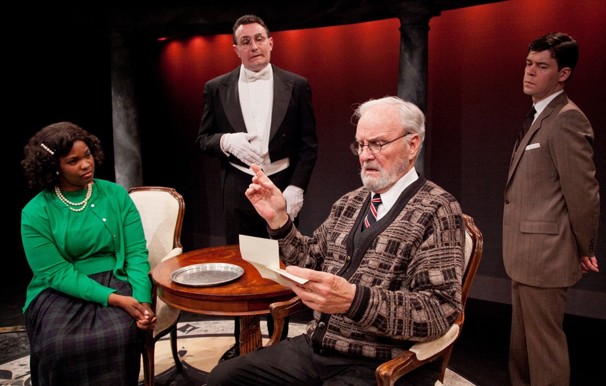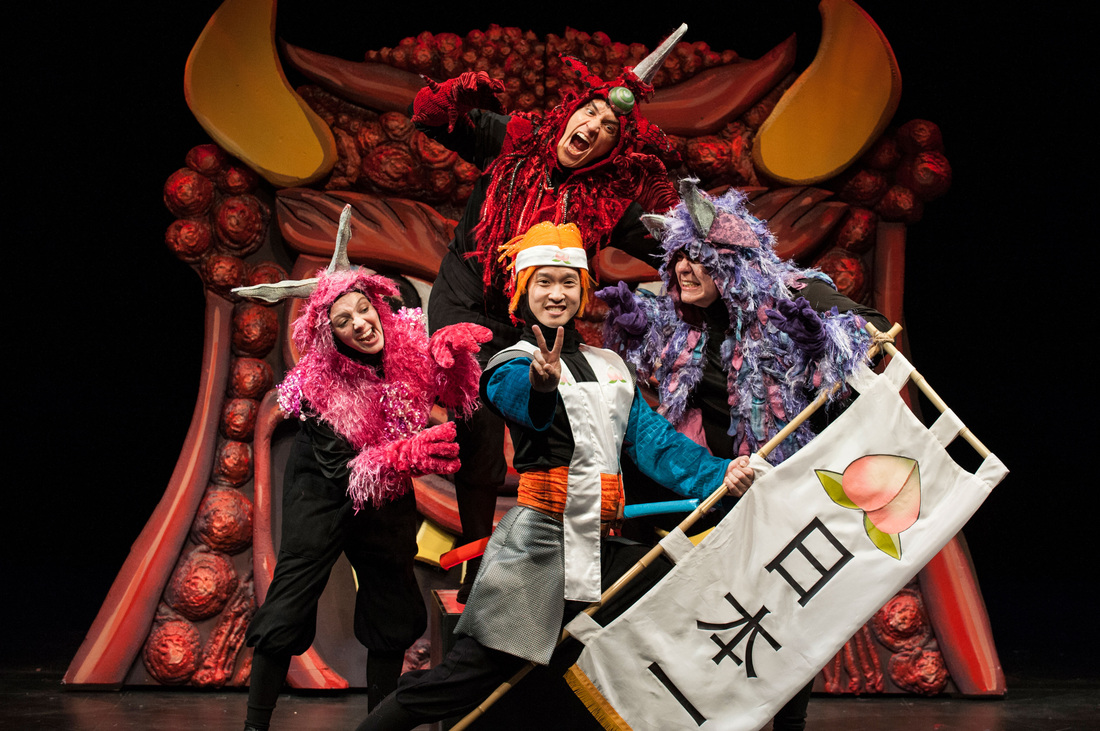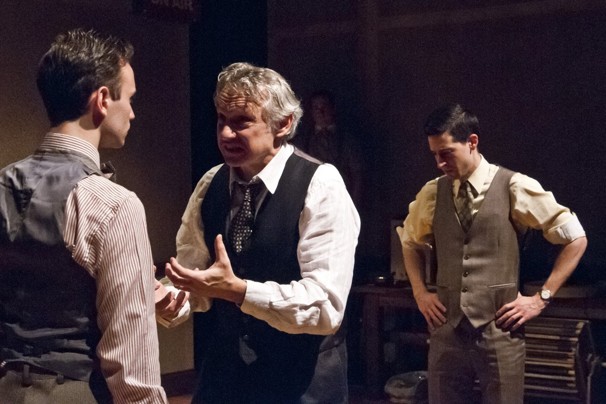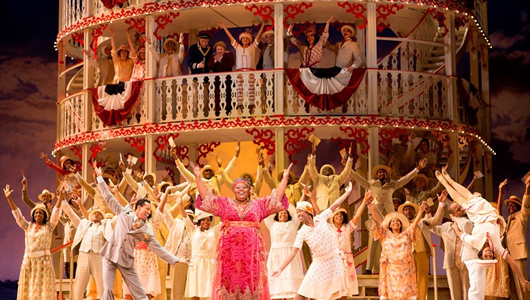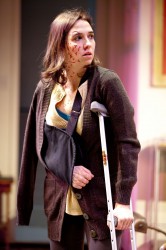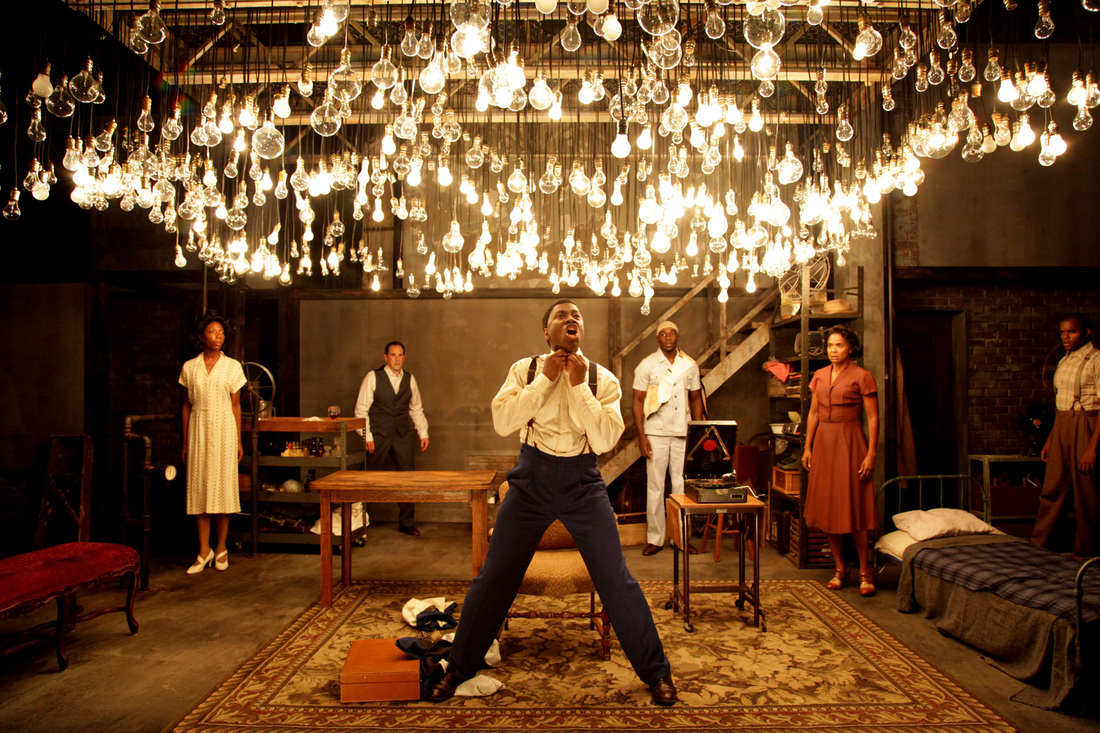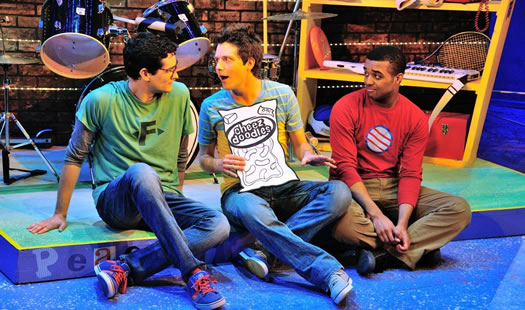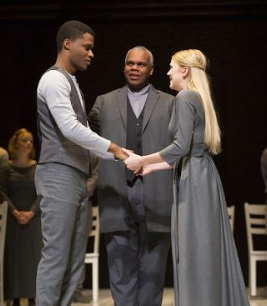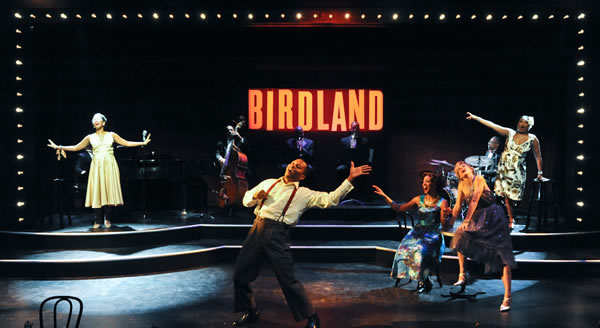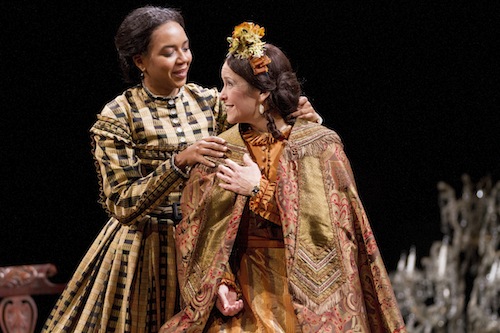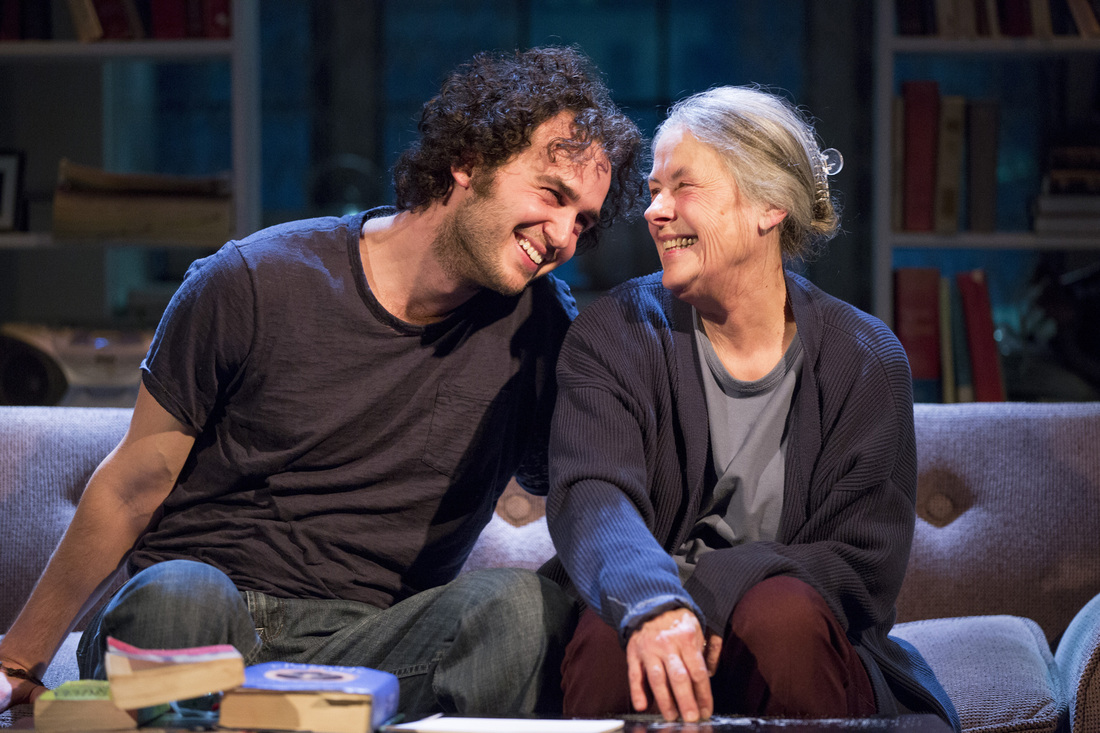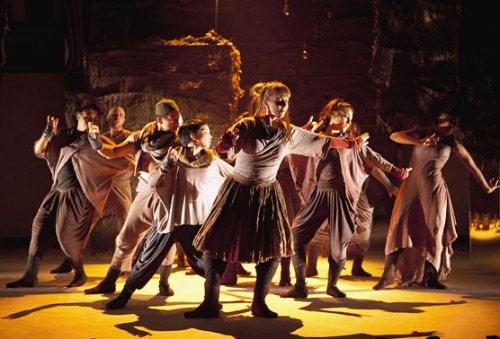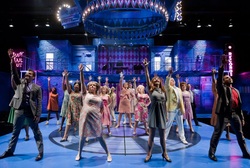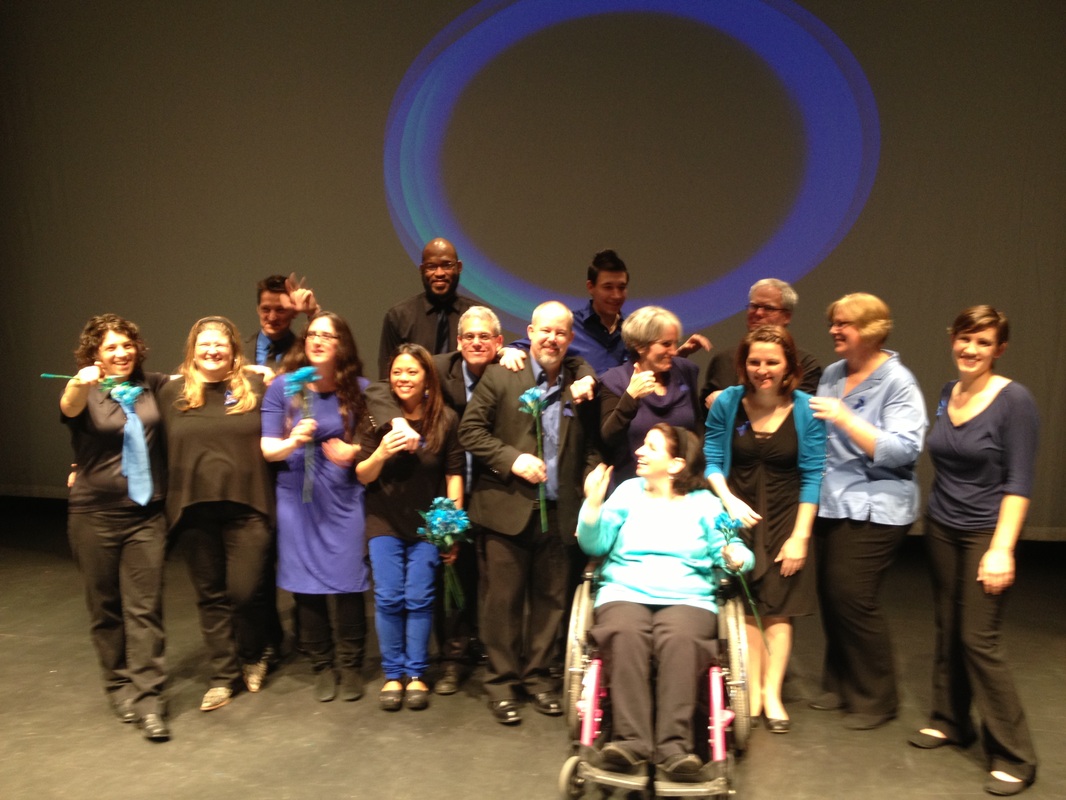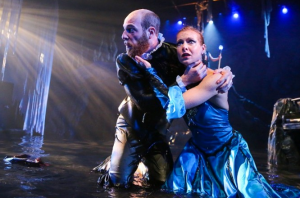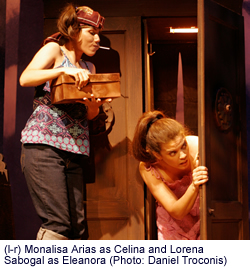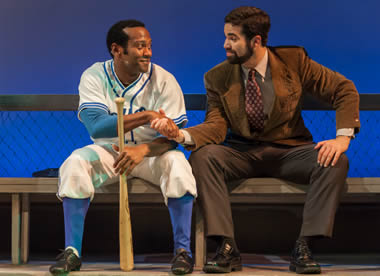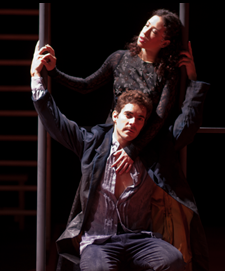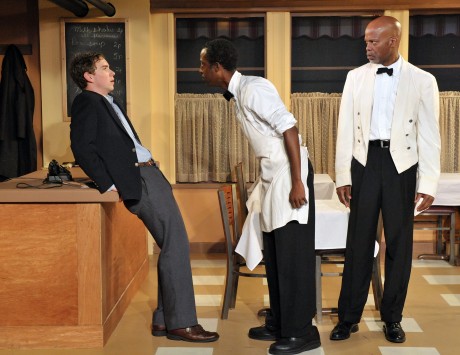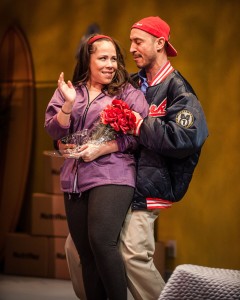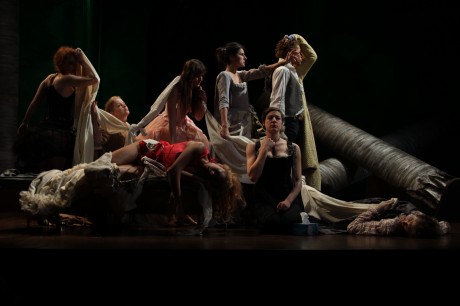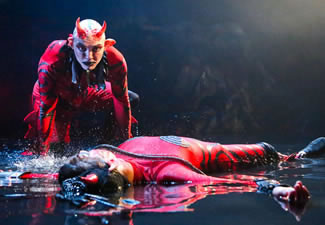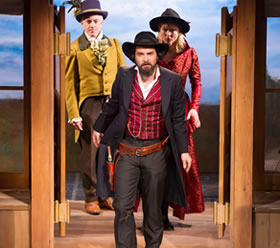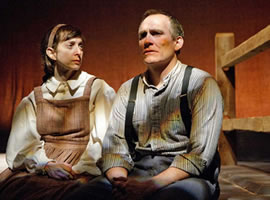|
America Women Writers National Museum presents The Dramatic Women Who Play Wright Wednesday, June 5th McLendon Room of the National Press Club (529 14th St. NW, 13th Floor) Event Details Meet & Greet with Writers at 11:30am Women Who Play Wright Discussion from 12:00pm Questions & Social at 1:00pm 50-state Project honors Women Writers from Kansas, Kentucky, Louisiana, and Maine at 1:15pm Please join three extraordinary women playwrights for a in-depth and engaging conversation about writing for the stage. American Women Writers National Museum welcomes Renee Calarco (The Religion Thing and Short Order Stories), celebrated playwright and professor at George Washington University; Jennifer L. Nelson (Torn from the Headlines and 24, 7, 365) and critically acclaimed director and playwright, now Director of Special Programming at Ford's Theatre; and Mary Hall Surface (Lift: Icarus and Me and Perseus Bayou, ), an internationally recognized playwright and director, and Artistic Director of the INTERSECTIONS: A New American Arts Festival. All AWWNM programs are free and open to the public. Click here for more information. 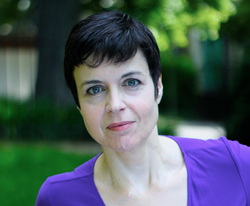 RENEE CALARCO Renee Calarco lives and works in Washington, DC. Her play SHORT ORDER STORIES received the 2007 Charles MacArthur Award for Outstanding New Play. Other plays include THE RELIGION THING (2012 Helen Hayes Recommended), KEEPERS OF THE WESTERN DOOR, THE MATING OF ANGELA WEISS, BLEED, and IF YOU GIVE A CAT A CUPCAKE (commissioned by Adventure Theatre in 2011). Her 10-minute play WARRIORS was published by One Act Play Depot in 2010. Other short plays include SEMPER FIDELIS, POUNDS AWEIGH, and FIRST STOP: NIAGARA FALLS. Renee is an artistic associate with First Draft/Charter Theater, the program coordinator for Naked Ladies Lunch, and a proud member of both DC Area Playwrights and The Dramatists Guild of America. She teaches playwriting at George Washington University and improvisational comedy at The Theatre Lab, and is a licensed professional tour guide. www.reneecalarco.com 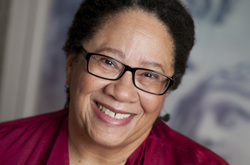 JENNIFER L. NELSON Jennifer L Nelson is currently Director of Special Programming at Ford’s Theatre. Prior to this appointment she was the founding Producing Artistic Director of the African Continuum Theatre Company, Washington D.C.’s only professional black theatre company. During that eleven year tenure, she produced twenty plays, multiple readings and other events. Ms. Nelson is a commended playwright and published poet. Her musical play Torn from the Headlines was awarded the 1996 Helen Hayes/Charles MacArthur Award for Most Outstanding New Play. Her three-minute telephone play Somebody Call 911 was commissioned by and featured at the 2001 Humana Festival at the Actors’ Theatre of Louisville. Her latest full-length play 24, 7, 365 was produced by Theatre of the First Amendment. Her full-length musical Hubert & Charlie was honored by the 2003 Larry Neal Writers’ Awards and was subsequently produced by the African Continuum Theatre. She has received several commissions to write issue-oriented plays for young audiences, most recently by Ford’s Theatre to bring to life historical character Elizabeth Keckly (2011 Washington Post Helen Hayes Theatre Award). She has also been commissioned to write short plays for the Theatre Lab; Active Cultures/Sportaculture Festival; the Cultures-in-Motion Program of the National Portrait Gallery; the Education Department of the Corcoran Gallery; the Kennedy Center Program for Families; and Round House Theatre’s HeyDay Players. She is a three-time grantee of the DC Commission on the Arts Individual Artist program, and a recipient of the Mayor’s Arts Awards for Excellence in an Artistic Discipline. 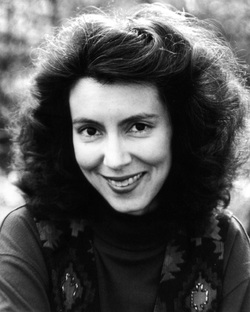 MARY HALL SURFACE Mary Hall Surface is a playwright and director specializing in theatre for families and multi-disciplinary collaborations. A DC theatre community member since 1989, her producers include Round House Theatre, Arena Stage, Folger Theatre, the National Gallery of Art and over 15 productions at the Kennedy Center. Internationally her work has been featured in productions and festivals in Germany, Canada, Japan, Peru, France, Taiwan, Sweden and Ireland. Nominated for four Charles MacArthur Award for Outstanding New Play and five Helen Hayes Awards for Outstanding Direction, she received the 2002 award for her musical, Perseus Bayou. She is the artistic director of INTERSECTIONS: A New America Arts Festival at the Atlas Performing Arts Center. She received the Charlotte Chorpenning Award, presented by the American Alliance for Theatre and Education for an Outstanding Body of Work as a Playwright, May 2006. She was a finalist for the 2011 DC Mayor's Arts Award for Service to the Arts.
0 Comments
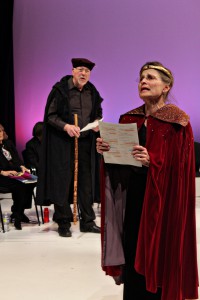 On Tuesday June 4th at 7:00pm, Round House Theatre presents Faraway and Close to Home as part of the Heyday Players performance series. Enjoy six short plays by esteemed local playwrights Kathleen Akerley, Bari Biern, Jacqueline E. Lawton and Stephen Spotswood. Performances are free and open to the public. They will take place at Round House Theatre Silver Spring, located a 8641 Colesville Road, Silver Spring. Click here for directions. The Heyday Players performance troupe is composed entirely of older adults who participate in the direction, rehearsal, and staged-reading performance of theatrical work at a variety of seniors groups and community centers in Montgomery County and the metro DC area. Every year, professional playwrights write plays for the Heyday Players based on a theme. This year join us for an evening of theatre dedicated to celebrating the great outdoors– campfire stories that draw you in and warm your heart. Conversation with playwright Katheleen Akerley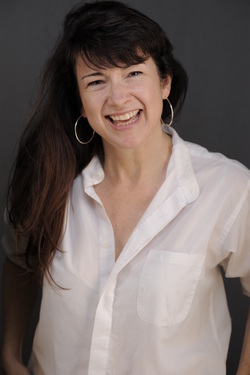 How did you become a playwright? I was working in the lab late one night . . . and was bitten by a radioactive Harold Pinter. What is it about this medium that appeals to you? The fact that ideas will be expressed in action: the sagittal attack on the transverse line. What made you choose to work in the DC area? What do you like about working here? Inertia as to your first question; as to what I like about working here, I'd say the fact that so many DC theater-goers want to have conversations about the work after the show. It's like the play gets re-expressed in another medium. What is your Heyday Players play about? I have two: one about The Goatman and one about Hook-Hand. Why should folks come out and see the Heyday Playwrights performances? The enthusiasm of the actors. What are you working on next? Where can we follow your work? I'm working on an open-ended road trip that will start on the first of July. I don't know where and when it will end. Conversation with playwright Bari Biern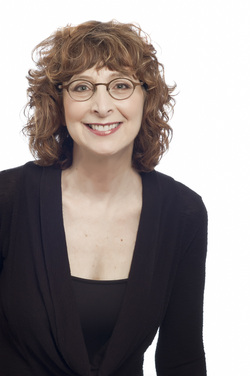 How did you become a playwright? I've been writing poems and lyrics since I could hold a pencil, but I didn't start writing plays until high school. What is it about this medium that appeals to you? I think this medium appeals to me because my parents gave me such a thorough and invaluable introduction to the theatre from a very early age. They took me to countless plays and musicals. They bought me original Broadway cast albums for every birthday, and complete Gilbert & Sullivan operetta recordings every Hanukkah. Who could ask for anything more? What made you choose to work in the DC area? What do you like about working here? I came to DC because a fulltime acting job in Boston fell through, leaving me scrambling like a poodle on the linoleum. I came here to visit some friends, decided I liked it and moved here a month later. The best thing about working here is the strong, vibrant and supportive theatre community. It's like a great big wonderful dysfunctional family! Also, opportunities abound. I've so enjoyed my collaborations with different theatre companies, each bringing a unique vision to the DC theatre scene. I've even had the opportunity to work with the Washington Ballet (to die for). What is your Heyday Players play about? My play, The Old and the Zestless (title suggested by the HD Players!) is about an aging soap opera actress who, upon being released--unexpectedly--from her contract, seeks refuge in a secluded cabin in the woods. She may "vant to be alone," but that's just not in the cards. Why should folks come out and see the Heyday Players performances? The Heydays are always a treat to watch. They bring their own personalities to the characters they play. They have a lot of fun when they perform--and that means the audience has a lot of fun, too. What are you working on next? Where can we follow your work? My next production is Gianni Schicchi, half of a pocket opera double bill presented by the In Series at GALA Theatre, starting June 15th. (www.inseries.org) I'm also completing an English libretto for Mozart's Abduction from the Seraglio, commissioned by the In Series and set to premiere this September at the Source Theatre. I'm turning the story on its ear and setting it in the old west. It's gonna be a hoot. (www.baribiern.com) Conversation with playwright Jacqueline E. Lawton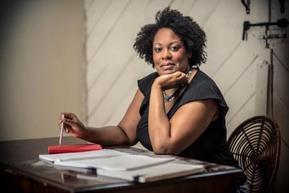 How did you become a playwright? I've considered myself a writer since I was about eight years old, when I started writing plays, poems and short stories to entertain my sister and to escape a sense of loneliness. I’ve been writing professionally since 2003 when I received my MFA in Playwriting from the University of Texas at Austin. What is it about this medium that appeals to you? I love the magic of theatre. I love that it's live. I love that it's ephemeral. I love the suspension of disbelief that captivates our imagination. What made you choose to work in the DC area? What do you like about working here? I moved to D.C. to learn how to be a Dramaturg at Woolly Mammoth Theatre Company. From there, I got a job working at the Folger Shakespeare Library and the next year, I went to work at Arena Stage. What I like about working in D.C. is that the entire theatre community feels like one big company of artists and administrators. There is a palpable hunger and passion to create and it's exciting when artists collaborate across theater companies. What is your Heyday Players play about? My play is called, Cadette Troop 227. It's about the 50th reunion of a Girl Scout Troupe. I imagined what might happen if some of my closest girlfriends: Shirley Serotsky (Associate Artistic Director, Theater J), Helen Pafumi (Artistic Director, The Hub Theatre), Erin Nugent (Costume Designer) and Jojo Ruf (General Manager, National New Play Network) and I had all been in the Girl Scouts together. It's such great fun. Why should folks come out and see the Heyday Playwrights performances? They Heyday Players are so passionate and talented! I love writing for them and love seeing perform. What are you working on next? Where can we follow your work? The world premiere production of my play, THE HAMPTON YEARS, just opened to previews at Theater J. Click here to learn more and purchase tickets. I'm also working on a new play, NOMS DE GUERRE as part of Playwrights Arena. It’s a coming-of-age socio-political drama that follows the evolution of a friendship between two women. It also addresses the war on women, the challenges of PTSD and the ever-changing role of women in society. Conversation with playwright Stephen Spotswood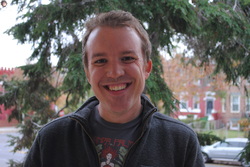 How did you become a playwright? I started off writing poetry and short stories. At the same time, I was also very involved in theatre in high school and college. It took several years for those two passions to combine themselves into playwriting. What is it about this medium that appeals to you? What I love most about the form is that it's writing and it's art, but it's not art that lives on a page. It's art that gets transformed by other artists (and I enjoy working w/ other artists very much) into a four-dimensional work. What made you choose to work in the DC area? What do you like about working here? I followed my girlfriend (now wife) here about ten years ago, but I'm not looking ot leave anytime soon. Or ever. DC not only has a very vibrant theatre scene, but it has a community with room to grow. There are lots of opportunities to partner with other independent artists to create new work. What is your Heyday Players play about? I have two in this year's collection. The first, THE GREAT OUTDOORS, is about a group of friends who have gone camping every year for half a century, and how they react when age threatens to curtail their annual tradition. The second, OLD MONSTERS, NEW TRICKS, deals with a group of senior citizens who run a haunted forest Halloween attraction and how they handle it when teenagers no longer find it scary. Why should folks come out and see the Heyday Playwrights performances? In theatre, we talk about underserved populations a lot. When we do, it's usually in terms of socioeconomics and regionality. But senior citizens might be the most widespread underserved population when it comes to art. Not only are their stories rarely seen on stage, but they don't get nearly as many artistic outlets. And, because of lack of mobility and fixed incomes, they don't get to see as much art. The Heyday Players tackles all of these disparities--its theatre written for this age group, being performed by them, and being taken to places where people their age have access to it. Not only should people support these performers and their work, but they should expose themselves to that work of their own benefit--it's stories you don't necessarily get elsewhere. What are you working on next? Where can we follow your work? I have a short play, THE MAN IN THE POWDER-BLUE SUIT, being performed as part of this year's Source Festival, which runs through June. This fall, I have two premiere productions--IN THE FOREST, SHE GREW FANGS (produced by Washington Rogues at Flashpoint in the Chinatown area of D.C.) and SKIN AND THE NOVEMBER SKY (produced by The Theatre Project at Player's Theatre in NYC)  One of the largest and most acclaimed professional theatre companies in the Washington, DC metro area, Round House Theatre is led by Producing Artistic Director Ryan Rilette, who joined the company in August 2012. Based in Montgomery County, Maryland, Round House Theatre produces nearly 200 theatrical performances each season at its 400-seat Bethesda theatre and 150-seat black box theatre in downtown Silver Spring. In addition, the company operates an education center in Silver Spring and annually reaches thousands of patrons there and across the region with strong education and outreach programs. Round House Theatre is a member of LORT (League of Resident Theatres), TCG (Theatre Communications Group), and LOWT (League of Washington Theatres). The theatre is a 501(c)3 not-for-profit organization with major support from Montgomery County, the Maryland State Arts Council (an agency funded by the State of Maryland and the National Endowment for the Arts), and the Arts and Humanities Council of Montgomery County. JACQUELINE LAWTON: Why did you decide to get into theatre? Was there someone or a particular show that inspired you?
JANE HORWITZ: I grew up in the Chicago area and my parents were theater lovers. As soon as I was about 12, they would take me along if they thought it was a play or musical I might like, and their comments afterwards were always knowledgeable and perceptive. I think the first musical I saw was the touring company of “My Fair Lady” when I was maybe 6 or 7. The first non-musical play I saw was “The Subject Was Roses” with two of the three original Broadway cast in the touring show, Martin Sheen and Jack Albertson. I was about 12, I think. I know the play is not beloved by critics, but as a kid I was bowled over by the dramatic interaction on the stage. Having only seen musicals until then, I didn’t know such intensity was possible. Funny story: When I was also about 12, my parents took me to a touring production of “The Threepenny Opera,” having more or less forgotten what it was about. I was studying the playbill as we sat down and loudly asked my mother, “What’s a prostitute?” Her eupemistic and evasive answer was a riot. JL: How long have you lived and worked as a theatre critic in D.C.? What brought you here? Why have you stayed? JH: I moved here with my then-husband in 1985. We had met in Dallas, TX, where we both had our first jobs after grad school. I worked in television news at the ABC affiliate in Dallas and had been their film/theater critic and arts reporter for several years after sort-of apprenticing and earning my sea legs as a general assignment reporter straight out of journalism school. When we got engaged, we decided to leave Texas. We first landed in the Hartford, CT area, but after two years we decided to try somewhere else that suited both our careers better. And that’s when we came here. I got a busy freelance gig with WTTG/Ch. 5 as their film and theater critic, when the station was still owned by MetroMedia, not Fox. When Fox took over and the new news director cut out all freelancers, I lost that gig and had to scramble. I was invited to join the critics roundtable show “Around Town” on WETA/Ch. 26 (local PBS station) and have been with them ever since, in various iterations, from the half-hour show to the short “interstitial” segments we do now. I also did some freelance feature writing and reviews in print – my first foray away from broadcasting. Eventually, The Washington Post chose me on a freelance basis to write “The Family Filmgoer” column, which began in the Style section, then moved to Weekend, and has been in syndication since 1994. In 1997, The Post’s then-Arts Editor John Pancake hired me to write (also as a freelance) the “Backstage” column, which included features and interviews with mostly local theater artists. I wrote that for 14 years. Now I am one of the freelance theater critics for The Post and occasionally also for Washingtonian magazine online. I stay because I very much like the whole DC area (apart from the traffic, of course) for its ever-growing cultural landscape and its physical landscape. I have a small but great circle of friends and colleagues and have now lived here longer than I lived in my home town of Chicago. And, I have watched the theater scene here grow from a scant few truly professional companies to a mind-blowing smorgasbord of theater – big, little, traditional, experimental, and everything in-between. So cool. JL: How do you define the work you do? Specifically, what is the role of the theatre critic in the world of theatre? What contribution do you hope to make in the D.C. Theatre community and the American Theatre? JH: I don’t call myself a critic very often, because to me, “critic” implies a certain scholarly background in the art one is covering that I don’t think I have. I’m just someone who has gone to the theater regularly since I was 12, and I try to bring to my reviews a sense for the reader of “being there” watching the show, and then, a kind of assessment of the show. I try to tell the reader whether I simply enjoyed what I watched and whether I think they will, and THEN, I try to assess the work on a sort of continuum. Where does it fit in the lexicon of theater across the ages? Is it derivative and unimaginative? Is it fresh and thoughtful? That sort of thing. I try not to engage in the John Simon “…and he/she’s ugly, too” kind of reviewing. I also hope, that in the years I wrote “Backstage” my coverage of the burgeoning small theater companies helped get them on the map. I didn’t cover them all. Sometimes it was just a question of time and space. Sometimes it was a question of whether they were professional enough not to be considered community or student theater, which we didn’t cover for the same time and space reasons. One had to draw the line somewhere. JL: If your work as a theatre critic doesn’t pay the bills, what else do you do? How do you balance this work with your play viewing and criticism? JH: This has been a nagging problem ever since I went freelance and I have never really solved it. When I had my three regular gigs – “Backstage,” “The Family Filmgoer” and “Around Town,” I made an OK living. When that ended – and I must admit, I had a good run with all three going strong – it became a struggle again. I have not, so far, done other work that is completely unrelated to arts journalism. That could may have to change. And my depressing advice to someone just getting started would be to try to get a full-time job WITH BENEFITS if at all possible, because decades of freelancing do not guarantee a comfortable retirement. JL: What skills and traits do you feel a successful theatre critic should have when writing about theatre, especially when it comes to new plays? JH: You have to either be able to repress any prejudices you have about new versus old styles of theater, or you have to admit them IN YOUR REVIEW. You have to have a long memory and you have to keep learning about new trends in theater. That can become a problem as you get older. Sometimes I have the sense that I’ve seen everything before. But you MUST remember that your readers, especially the younger ones, haven’t! You have to keep your perspective fresh. You need to bring in topical references to help people anchor themselves or to help them picture what you’re writing about. You must be honest about your emotional response to a play, for they are the most important. Trying to sound too erudite or pedantic – a failing of mine, I often think – in a daily paper (and not in The New Yorker, for example) puts readers and editors off. Still, it is also a reviewer’s job to take a play on its own terms and decide whether it succeeds, and where the piece belongs in the whole world of theater, whether it is major, minor, or a trifle. JL: What is your writing and viewing process? Do you read the script prior to seeing a production? Do you research the author and/or world of the play? Do you read the program notes? JH: I always read the program notes, and check up on the background of the playwright, but I only read the script if I’m about to interview the writer. I often did that for “Backstage,” but if I’m reviewing, I just let the play hit me cold and see what happens. I might ask for a copy of the script afterwards for reference as I write my review. Sometimes I’ll quote a couple of lines from the play, for example. JL: In the article, “Ohio Critic's Tough Words Elicit Rough Reaction,” Denver Post Theater Critic John Moore states: “There is no universal rule book for criticism, no how-to manual. My guidelines: Be true to your visceral emotional response, good or bad. State your case and back it up. Be a catalyst for discussion. Encourage dialogue. Don't be personal. Never try to be funny at the expense of someone's feelings.” What guidelines, rules or standards do you have for your own work? Have you always upheld them? If so, at what cost? If not, what shifted the line for you? JH: I agree with all of that, and referred to some of the same things in earlier answers – none of that “he/she’s ugly, too” kind of writing. I try to be honest about my emotional responses to work, and I try to highlight good acting and note poor work without being cruel. I feel like I bend over backwards in this regard, and yet I am often amazed how artistic directors and others can read a truly mixed review and see only the bad. I guess they’re just too close to the work. If I have learned anything, it is to avoid cleverness just for the sake of it, and to recognize the amount of work that goes into productions, even ones that don’t work. That does NOT mean, however, that I or any critic should say something is good when it isn’t. As a reviewer, you are also something of a consumer reporter, telling people when and where to spend their hard-earned money. And besides, telling people they did good work when they didn’t, just to be a booster, does no one any favors. It’s akin to these helicopter parents of today telling their little ones “good job!” every time they do something ordinary. They’ll get out into the world and wonder where all the praise went. JL: What is the greatest part of being a theatre critic? What has been your most difficult challenge? JH: The greatest part is getting to go to the theater all the time! That is my synagogue/church/mosque/temple, where, when things are working, one can safely navigate the human soul, sometimes in ways that also feed the eyes and ears with beauty and music and poetry. Sounds corny, but that’s the truth. JL: Who are your favorite playwrights? What is it about their work that inspires or draws you to them? JH: Tom Stoppard, August Wilson, Chekhov, Sarah Ruhl, Lanford Wilson, Wendy Wasserstein, plus usual suspects Shakespeare, O’Neill, T. Williams. Also Pinter, despite the cold-fish aspect. In musicals Sondheim and his various collaborators, and always Rodgers&Hammerstein, Lerner&Lowe. JL: DC artistic directors … JH: Won’t list “favorites,” but it is a certainty that DC area theater would not have grown into the ever-expanding scene it is today without the likes of pioneers Howard Shalwitz (Woolly Mammoth) and Joy Zinoman (Studio) and Jerry Whiddon (Round House) and Jim Petosa (Olney) and, among smaller theaters, Chris Henley (WSC Avant Bard), Carolyn Griffin (MetroStage), Kasi Campbell (Rep Stage) taking chances – note, all of these but Shalwitz and Griffin are “emeritus” now – and raising the bar in the 1980s, 90s, and 2000s. Everyone here today stands on their shoulders. More recently, Molly Smith, has transformed Arena Stage, both physically and, sometimes more controversially, in its programming. Anyone I left out, please ascribe it to forgetfulness. JL: DC actors, designers and directors are .. JH: I always look forward to seeing Rick Foucheux, Holly Twyford, Nancy Robinette, Brian Hemingsen, Jennifer Mendenhall, Craig Wallace, Will Gartshore, Michael Russotto, among many others, whom I feel I kind of watched grow up as artists. Among the younger generation, Erin Weaver, Danny Gavigan, Erika Rose, Patrick Bussink, Felicia Curry, and on and on. The fact that there are too many to mention (or for me to be able to remember offhand) is a great thing. Among directors, I love John Vreeke’s work with actors. Others whose work I always approach with eagerness include Jeremy Skidmore, Michael Dove, Kasi Campbell, Joy Zinoman, Howard Shalwitz, Paata and Irina Tsikurishvili… We have a strong roster of scenic, sound and lighting designers in this area, from Giorgos Tsappas, whose “brutalist” abstract designs with metal are always arresting, to the comic-infused designs of Natsu Onoda Power, to A.J. Guban’s whimsical work for Constellation’s myth-based shows, to veterans such as Tony Cisek, Russell Metheny, and Daniel Wagner (lighting), Dan Covey (lighting) and many others. I just recently reviewed a 3-play rep by Pinky Swear Productions at the Writer’s Center in Bethesda and noticed that on a shoestring, lighting designer Chris Holland expertly expanded on the shifting moods of the plays. The work of costume designers such as Helen Huang and Debra Kim Sevigny is always a treat to see. The late William Pucilowsky ingeniously clothed Washington Stage Guild casts in elegant Victorian and Edwardian garb for their Shaw and Molnar shows, though his budget was small. And I must not forget Tom Teasley, the composer/percussionist and world music maven whose live work at Constellation shows has added so much. I am sure I have left many people out. JL: DC playwrights are … JH: Often intriguing in their work, but still need to stretch and get productions that earn broader attention. I just saw two 1-acts – the previously referenced ones at Pinky Swear, that with some polish could have life beyond DC. Some of the wonderful “devised” and/or site-specific work by dogandpony dc and Taffety Punk pushes boundaries that other cities should note, but these are group efforts more than the voices of individual playwrights. JL: DC audiences are ... JH: Pretty smart, I think, and good – but not great – about remembering to silence their cellphones. I still have internal fits about the coughing thing, that when one person starts, you get all this “sympathy” coughing around the auditorium. It’s worst at The Shakespeare Theatre and the Ken Cen, for some reason, and it almost ALWAYS happens during the quietest moments in a show. Audiences at the smaller, more experimental theaters are very quick on the uptake. The worst audiences, it seems to me, are season ticket holders who go because they kind of have to, then don’t like the play and start grumbling in stage whispers. Then there are the sound-enhancing headphones that whistle and squeak. Ah, well. JL: How do you feel the DC theatre community has addressed the issues of race and gender parity? How has this particular issue impacted you and your work? JH: Arena Stage under Zelda Fichandler and then Doug Wager, and The Shakespeare under Michael Kahn were national pioneers in the area of “non-traditional casting.” Diverse casting, especially in classical plays, is a given here nowadays. Less so in contemporary plays where “realism” might mean casting all-white actors in a play about a white family, or all-black actors in a play about African-American family. Or, for example, how could you “non-traditionally cast” David Mamet’s “Race” without changing the whole play and its (rather bizarre) meaning? I don’t know the answer to that. The biggest tragedy is the failure of DC theater to keep a well-funded, nationally recognized African-American regional theater up and running. As for impacting my work, I have had to learn along with the American public to approach questions of race and gender with broader knowledge and sensitivity, and learned through mistakes, too. As a reviewer/journalist, I can’t really assess whether my gender in particular has affected my employment. I have always managed to work, though unevenly compensated, as a freelancer. And my early days as a critic were actively encouraged by a male news director who thought he saw a gift and pushed me toward it. JL: What advice do you have for an up and coming DC based theatre critic who has just moved to the area? JH: Find a day job you don’t hate, so you won’t starve and you can start getting vested in some sort of a pension and other benefits. I’m not kidding! You wait too long, you’ll be sorrrrry! And there are precious few full-time jobs as theater critics left in this country. I bet we can count them on just a few hands and feet. Then…whether you’re a veteran critic simply coming to a new city, or a newbie just starting out ‘cause you “just love theater,” or (like me) thought you could act and then realized you couldn’t, start going to theater all the time and everywhere. Find out who’s doing the newest stuff of quality and see it. Find out who isn’t, and give them a miss for a while, hoping they’ll improve. Find out who the veterans are who can give you a sense of theater history in DC -- it’s quite an interesting history. If you’re really new to the game, try to audit theater history courses at area universities. Some of them (perhaps all of them) are taught by local theater artists. Hang around for talk-backs when the playwrights, directors and actors take part. If you can’t afford tickets and can’t get on press lists right away, volunteer as ushers, though that’s a pretty crowded pool, I think. Don’t assume that the big theaters are doing all the good work, and conversely, don’t assume that the big theaters are never interesting. Neither is true. There’s interesting work going on at Arena, the Shakespeare Theatre Co, Woolly Mammoth, Studio, but also at Rep Stage, MetroStage, Forum, No Rules, Synetic and many others. Don’t be too forgiving of small, cash-strapped companies in terms of production values. That’s part of their creative job, making a show look like something on a dime. There’s no excuse not to and it’s part of what helps small companies get to the next level. As an example, I’d refer you to Forum’s staging at Round House Silver Spring of “bobrauschenbergamerica,” in which Natsu Onoda Power replicated Rauschenberg’s iconic works in theatrical materials like papier-mache. I’ve seen whole ornate sets at Signature in that company’s early days made from styrofoam sprayed with paint. My rant now has ended. JACQUELINE LAWTON: Why did you decide to get into theatre? Was there someone or a particular show that inspired you?
JENNIFER PERRY: I didn’t get to see many shows as a child growing up in Upstate New York even though I loved Broadway musicals ever since hearing the songs from “Annie” (cliché, I know). I got into theatre – listening to cast recordings and participating in a school chorus that sang a lot of showtunes – as a means of escape from my usual life. I was a very serious kid who did well academically and it was always nice to have a breather from that world every so often. Today the same thing holds true even if my love for theatre has extended beyond splashy Broadway musicals. After college I pursued a career in government/international affairs. Theatre still is my escape from my politics-centric life whether seeing many of the latest shows in New York or nearly everything here in DC. JL: How long have you lived and worked as a theatre critic in D.C.? What brought you here? Why have you stayed? JP: I moved to DC a few months after I finished college in 2001 to attend grad school at American University’s School of International Service. I stay in DC because although I love the city more than any other place in this country, it’s also where I need to be for my career. I’m thankful it also has a fabulous theatre scene because I don’t think I could survive very well in an American city that didn’t have that (if I were overseas, it would be an entirely different situation). Even before assuming a critics position, I still saw almost everything in town. My theatre critic position in DC didn’t start until about two years ago when my husband Elliot Lanes, who works in the theatre, talked to Joel Markowitz about writing for him. I always loved to write – and people told me I was talented in that area – so I decided to fuse my two interests and take up writing for Maryland Theatre Guide and later DC Metro Theater Arts. Now, I write for BroadwayWorld and DC Theatre Scene. JL: How do you define the work you do? Specifically, what is the role of the theatre critic in the world of theatre? What contribution do you hope to make in the D.C. Theatre community and the American Theatre? JP: I think the role of a theatre critic is to promote awareness of and enthusiasm for the art form to be sure, but to also provide honest reactions to each production we see. It’s not always easy to balance the two elements, but my hope is that I contribute reviews that do just that. In terms of providing reactions to production, the idea is not simply write to influence the ticket buying habits of the public, but to provide an informed and insightful outsider perspective on the outcome of a particular creative endeavor. To this end, our critiques can and should contribute to the institutional memory of a show (particularly world premieres and less-produced works). They also might inform the actors, directors and playwrights and others of things that might have worked and might not have worked as they continue to not only pursue excellence in that particular production, but pursue their craft more generally. Our thoughts are of course subjective, but I would hope they’d be examined in one way or another. If deemed valid, they might inform the creative process. JL: If your work as a theatre critic doesn’t pay the bills, what else do you do? How do you balance this work with your play viewing and criticism? JP: Even though seeing/critiquing shows eats up a huge portion of my time and I take it seriously, it’s most definitely not what I call my actual career at present. I work for the US Government as an analyst and I love both things equally even if they’re vastly different. It’s not always easy to balance the two – particularly as I not only review many theatrical productions, but also cabarets/concerts for two websites – but I have good time management skills and can write pretty quickly. Thankfully, many theatres schedule their press performances on weekends and, as a result, my weekends are usually devoted to seeing shows – sometimes up to four in two days. Although some may find this to be too demanding, it’s ok because I enjoy it immensely and it’s something my husband and I can often do together. JL: What skills and traits do you feel a successful theatre critic should have when writing about theatre, especially when it comes to new plays? JP: Many new plays deal with major social or political issues, whether historical or contemporary. While it may be asking too much for every critic to come into the theatre with a well-rounded knowledge base about every issue in every play – and I realize that it’s the playwright’s job to communicate the issue to the audience while at the same time telling a story – I do feel that the most successful critics of ‘issue-based’ plays are ones that have a knowledge of things beyond the specific world of the theatre and can bring that to bear in their analyses. However, it’s a double-edged sword. There have been times that I’ve attended plays dealing with particular political situations in particular countries and have been attempted to go into ‘Jen Perry, international affairs geek-mode’ and put my academic/analyst hat on a bit too much’ until I (hopefully) catch myself and remind myself that I am assessing a theatrical work. It’s all about finding a balance – using what you know, but not allowing it to cloud your theatre critiquing thought process too much. With critiquing musicals (my first love), I do think that although some skills in ‘straight play’ critiquing are also applicable, I do strongly think one needs an extremely solid knowledge base and understanding of the history and current state of the American musical theatre and its uniqueness to write an articulate review. A critique of a world premiere musical, for example, needs to consider the state of the libretto, but the score is also a huge component. Without some music knowledge – and appreciation for music – it can be difficult to give adequate, informed attention to things such as the music and orchestrations. Not everyone is well-equipped to review musicals, just as everyone is not well-equipped to review Shakespeare. JL: What is your writing and viewing process? Do you read the script prior to seeing a production? Do you research the author and/or world of the play? Do you read the program notes? JP: I usually review a limited amount of web-based information about a show (if I am not already familiar with it) before seeing it. This may include interviews with the creative team and/or synopses of a show found on a theatre website. I never read the script. On occasion, I might read other reviews of the play if they exist, but that’s situation dependent. I do read program notes. Sometimes this happens immediately before seeing the play and other times it happens after I see it. Again, it’s situation dependent. I don’t think a one-size-fits-all approach to researching/preparing to see a show is all that helpful for me. JL: In the article, “Ohio Critic's Tough Words Elicit Rough Reaction,” Denver Post Theater Critic John Moore states: “There is no universal rule book for criticism, no how-to manual. My guidelines: Be true to your visceral emotional response, good or bad. State your case and back it up. Be a catalyst for discussion. Encourage dialogue. Don't be personal. Never try to be funny at the expense of someone's feelings.” What guidelines, rules or standards do you have for your own work? Have you always upheld them? If so, at what cost? If not, what shifted the line for you? JP: Honestly, that’s a pretty solid description of what I try to do in my writing. In the case of BroadwayWorld, I review some non-professional shows that involve teenagers still in the early stages of learning their craft. I don’t subscribe to the ‘everyone gets a gold star’ approach to covering those shows, but I do try to be a bit more sensitive to the fact that many times those shows are not only meant to entertain, but also to help the kids learn. At the same time, while I don’t treat world premiere plays with kid gloves, I do try to keep in mind the development process and encourage rather than simply, well, hate. JL: What is the greatest part of being a theatre critic? What has been your most difficult challenge? JP: The greatest part is that I get to combine my love for writing and analysis, which was largely developed in strict academic and government worlds, with my love for theatre. The most difficult challenge is remembering what I think the role of a theatre critic is as I write my reviews and always letting that guide how I write about everything I see. JL: Who are your favorite playwrights? What is it about their work that inspires or draws you to them? JP: I tend to gravitate toward contemporary writers. In recent years, I’ve been hugely impressed with all of Danai Gurira’s plays at Woolly Mammoth Theatre Company. She’s not only a brilliant writer and storyteller, but she tackles issues that far too few playwrights are willing to tackle. In terms of more established writers, I really like Martin McDonagh because he achieves the perfect balance of outlandish yet insightful. David Lindsey-Abaire is another favorite because he’s such a great storyteller and always seems to balance that really well with providing insights into American society and the human condition more generally. JL: DC artistic directors … JP: For the most part, they are pretty fearless and achieve a nice balance of new works and more familiar fare. I particularly appreciate the ones who take the most risks even if they may not always pay off. JL: DC actors, designers and directors are .. JP: Seem to never stop working. They’re everywhere! JL: DC playwrights are … JP: An eclectic bunch, some of whom are worthy of a national platform. JL: DC audiences are ... JP: For the most part, savvy and sophisticated but not as diverse as I’d like to see. JL: How do you feel the DC theatre community has addressed the issues of race and gender parity? How has this particular issue impacted you and your work? JP: Outside of the theatre, I work in a very white male-dominated environment and that, along with my sociology-focused undergrad education, has made me more conscious of racial and gender issues not only in my own worlds, but also more broadly. As a result, I know too well that gender and race (along with disability status, sexual orientation, or ethnicity) can impact all forms of perception – how we perceive ourselves and how others might perceive us. That being said, I do think there’s adequate gender and racial parity in DC theatre overall. Some areas could be improved – for example, I’d love to see more female musical directors – but my overall thinking on this issue is that one should not get a play produced or get a creative gig in the theatre primarily because of gender or race or some other non-modifiable attribute. For example, I’d hate to see a theatre company to only choose to present plays by female writers (unless it is codified in a mission statement) because it wants to fix what it perceives to be a wrong. If a female playwright has a strong play, certainly it should receive as much attention as one written by a male. However, I’d hate to see the play chosen to fill a quota. If there’s a decision between two plays and the stronger play is written by a male, the slot should go to the stronger play. To my mind – and this pertains to the theatre, my own career/political world, and more broadly – ‘you either have it or you don’t.’ One shouldn’t try to blame a lack of success on things like gender, race, or even disability (and I say this as someone who stutters severely when I speak). If a person thinks he/she is being overlooked due to one or more of these attributes, it is all the more reason to strive to be better than everyone else and give others no excuse to overlook you. Be confident in what you can do. JL: What advice do you have for an up and coming DC based theatre critic who has just moved to the area? JP: See everything you can even if you’re not reviewing it. Be fearless when you write. JACQUELINE LAWTON: Why did you decide to get into theatre? Was there someone or a particular show that inspired you?
DEBBIE MINTER JACKSON: I’ve been a performer (singer, dancer, actress—a rather mediocre triple threat) since college and during my early years in D.C. As an English major, writing about the theater became a natural as auditions and shows dwindled, and now I’m living my bliss – watching all the theater I could possibly want, and writing about it. JL: How long have you lived and worked as a theatre critic in D.C.? What brought you here? Why have you stayed? DMJ: Federal work in Public Health enticed me here from Chicago in 1991, which was great since I’ve been targeting this area for years. It’s a sweet spot between the bustle of NYC’s Broadway and the cultural legacy of the South where I can feel the spirit of ancestors still hovering along valleys and hills. I met my life-partner Bill at Fords Theatre at a discussion on Lincoln, Emancipation and Race. Need I say More??? Plus, this area a treasure trove of cultural events and appreciation for the arts that one could possibly imagine—sometimes dirt cheap or free. JL: How do you define the work you do? Specifically, what is the role of the theatre critic in the world of theatre? What contribution do you hope to make in the D.C. Theatre community and the American Theatre? DMJ: I consider myself more a “reviewer” than a “critic” since I appreciate what the artists and producers are trying to do even if they don’t quite achieve it. I hope to add to the rich dialog about a play coming at it from my unique perspective as a performer and woman of color. My POV makes a difference and needs to be at the table, thus, I’d like to think I make a valuable contribution to the theater scene. JL: If your work as a theatre critic doesn’t pay the bills, what else do you do? How do you balance this work with your play viewing and criticism? DMJ: I’m an administrative officer in Public Health having worked in three agencies, Health Resources Administration, National Institutes of Health and now the National Center for Health Statistics, part of the Center for Disease Control and Prevention. That’s a mouthful! I currently staff a National Committee dealing standards, electronic medical records, population health issues, and privacy and confidentiality—issues that effect and impact all of us. So far, I’ve been able to keep my two career paths separate and on track since they rarely overlap, since. I can select plays to review monthly according to my schedule and availability. JL: What skills and traits do you feel a successful theatre critic should have when writing about theatre, especially when it comes to new plays? DMJ: It takes so much to get a new play on its feet that I think that people should come with an open mind and appreciate that it’s a work in progress. There is no reason to come to the theater prepared to rip a new play to shreds just because it’s not polished. At the same time, a critic/reviewer shouldn’t try to “fix” or re-write a play. That’s also not our role. We see what we see and call it as we see it, with the caveat that it’s a work in progress. JL: What is your writing and viewing process? Do you read the script prior to seeing a production? Do you research the author and/or world of the play? Do you read the program notes? DMJ: To generally stay in tune with the theater process, I attend meetings of Footlights, a play reading group where directors and performers join us, so we have a great time discussing the beats, dynamics, intentions and execution of plays. For my specific assignments, I try to read anything that the theater posts, but not much more before I see it. I generally want to have as close as a “virginal” experience as possible. Even when I have access to the script, I’ll just peruse it but not read the second act until after I’ve seen it—there’s nothing like having a play unfold right before your eyes. After I’ve seen it, then I’ll scour all the reading material, notes, everything possible. I used to try writing the review from beginning to end, but I’m developing a new method to keep up with the multiple assignments—get down the basics of what I saw and felt, no matter if its gibberish, then clean it up as real text later. I’ve been at this for almost 10 years, I was an original writer for D.C. Theatre Scene, and I’m still always discovering something new. JL: In the article, “Ohio Critic's Tough Words Elicit Rough Reaction,” Denver Post Theater Critic John Moore states: “There is no universal rule book for criticism, no how-to manual. My guidelines: Be true to your visceral emotional response, good or bad. State your case and back it up. Be a catalyst for discussion. Encourage dialogue. Don't be personal. Never try to be funny at the expense of someone's feelings.” What guidelines, rules or standards do you have for your own work? Have you always upheld them? If so, at what cost? If not, what shifted the line for you? DMJ: I like the guidelines identified. My connection as part of the health care provider system provides the physician’s mantra—“Do No Harm” which also works for me. I can usually find something salvageable in a play and I don’t know if I’ve ever given a rating—Not Recommended—that’s probably not a good thing, but that’s where I am. I’ll give a “Somewhat Recommended” because flaws and all, there’s usually Something to be worth the trip to somebody. JL: What is the greatest part of being a theatre critic? What has been your most difficult challenge? DMJ: When I was performing, I used to regret missing shows because I was on stage! Now, whether I’m reviewing or now, I can see just about anything and everything I could possibly want. The challenge is doing justice to a piece, especially when I’ve got a pile-up with multiple reviews due in a short turnaround. I try to get to the essence of a show, get an idea of the intention and wrestle with it to get it right, strike the right balance, especially with a criticism, making a strong case for why I take a position. A basic rule for a budding playwright, (I’m a longtime member of the Black Women Playwrights’ Group), is to Show what’s happening, not just describe it. Well, I do something similar with reviewing by explaining why I take a particular position—not just say I like or dislike something. JL: Who are your favorite playwrights? What is it about their work that inspires or draws you to them? DMJ: Lynn Nottage—Everything she touches and tackles comes from such an amazingly real place. August Wilson—his work is timeless and eternal. When Kennedy Center did his cycle in ultra-staged reading, that was a testament to his artistry and the creative center of this place. JL: DC artistic directors …
JL: DC actors, designers and directors ... DMJ: Are committed to and love theater for theater’s sake. I love hearing reactions from NYC actors in performance here, and they say the same thing—the NYC theatre scene is such a business, while performing here is like a breath of fresh air. It’s a reminder of the love of the art. JL: DC playwrights ... DMJ: Have wonderful opportunities to get their works out with the various festivals-- Source, Fringe. There’s so much talent here. JL: DC audiences... DMJ: Are relentless in supporting and seeing theater. No matter what little hole in the wall, D.C. audiences will find it if it’s a theater space. We were in the dungeons of the old Wooly, the leaky treasured space of Clark Street Theater, a location which could barely be located via GPS. But audiences found their way there. JL: How do you feel the DC theatre community has addressed the issues of race and gender parity? How has this particular issue impacted you and your work? DMJ: I think there has generally been increasing openness in the community to address historical aspects of race and gender mainly because of the smaller theaters that have a voice. From the early Source Theater Festival to the current D.C. Black Theater Festival and much in-between, there are ongoing avenues to support works, although there should always be more. At the same time, while the D.C Theatre Community appreciates the importance of the issues and are fascinated by the works conceptually, they don’t really know how to support new voices. I’ve seen some incredible productions from Robert O’Hara’s Insurrections, Holding History to last year’s Whipping Man and so much in-between and more to come that should be supported and encouraged. As for how this has impacted my work, the Black Women Playwrights’ Group has been my incubator space to nurture new work, so I have not personally been negatively impacted or limited by race and gender issues in my performance or writing efforts. JL: What advice do you have for an up and coming DC based theatre critic who has just moved to the area? DMJ: See everything possible, read other reviews, mingle with artists and get a feel for this wonderful place. JACQUELINE E. LAWTON: Why did you decide to get into theatre? Was there someone or a particular show that inspired you?
JENN LARSEN: When I was very young I saw Derek Jacobi's Hamlet on public television and was completely transfixed by his vocal command and ability to make the text absolutely clear. Watching that incredible performance made me fall in love with Shakespeare. Soon I was reading all his plays, and getting mercilessly teased for it in school. Still, I didn't consider theater as a profession until just before choosing universities. There must've been some subconscious desire at work. When I went on tour with National Players after college, we did workshops for underserved communities. One teacher told me, "Good luck, my students don't get Shakespeare. They just aren't smart enough." It was an unbelievable moment. I was determined to prove her wrong. The best monologue that day turned out to be delivered by the boy she thought was the worst troublemaker. He got it. Everyone can fall in love with language, with theater, with Shakespeare. That moment clinched it for me. JL: How long have you lived and worked as a theatre critic in D.C.? What brought you here? Why have you stayed? JL: I originally came to DC to get my undergraduate degree in Drama at the Catholic University of America some twenty years ago. I was lucky to have amazing and dedicated professors who fueled my love of the stage: Bill Graham for acting, Chris Wheatley for Shakespeare, directors Jim Petosa and Bill Foeller, designers Gail Stewart Beach and Tom Donahue. Early on I realized DC's theater community had a strong history and truly vibrant local talent. The city seduced me slowly by being livable and lovely. It was relatively easy at that time to do your own thing and start a small theater company. Space was certainly cheaper. I'd had grand ideas of leaving eventually, but after falling in with like-minded friends and creating our own world, I stayed, working as an actor and a costume designer. Eventually I took a break from both, but by then I was entrenched in DC. When I began writing online in 2005, I decided to start reviewing theater, informally but slowly gaining my voice. When I helped found We Love DC in 2008, taking on the arts and culture editor role, theater criticism became a serious commitment. In hindsight it was a natural progression. My training at CUA was strongly based in theater history and textual analysis. Artist, critic, and audience are all engaged in a powerful dialogue about what theater means, and it's exciting to be part of that. JEL: How do you define the work you do? Specifically, what is the role of the theatre critic in the world of theatre? What contribution do you hope to make in the D.C. Theatre community and the American Theatre? JL: Theater criticism becomes historical record. The role of the critic is to capture, document, and contextualize production. Performance is beautifully ephemeral. Words about performance last. Beyond the aspiration, though, is the practical! You can't escape the fact that people read reviews to decide whether or not to spend their time and money on seeing a production. Honoring both is the contribution I strive to make. JEL: If your work as a theatre critic doesn’t pay the bills, what else do you do? How do you balance this work with your play viewing and criticism? JL: I've been struggling with illness the past year, so that's the main issue I currently balance against writing. But the days when I was so intensely worn out and depressed, theater was the bright star that kept me going. That was true before, when I was working as an office manager to pay the bills. But we're all multitasking now. No one way will work for everyone. I used to write early in the morning, before that, late at night. The challenge is learning how to split focus without degrading value. JEL: What skills and traits do you feel a successful theatre critic should have when writing about theatre, especially when it comes to new plays? JL: Thoughtfulness, empathy, and observation are the key traits I value. You're taking in a fast flood of words, ideas, and clues when viewing the production. Be open first, formulate after. Probably the most difficult skill to learn is how to separate your personal preferences in order to critique a production on its own terms. I don't think of new plays any differently than old plays. All plays were new once. If it's in performance, and people are paying to see it, then it's deemed ready for criticism. That being said, if a new play is overtly political, I tend to judge it on relevance and whether it might be performed 10, 20 years down the line. JEL: What is your writing and viewing process? Do you read the script prior to seeing a production? Do you research the author and/or world of the play? Do you read the program notes? JL: I try to approach the production completely fresh, so I don't read the script before first viewing. However, often you already know the play, which can then be tricky as you have to really release your preconceptions. Sometimes I take notes during a performance, but I try to minimize that as it tends to take you out of the flow of the piece. I'll write up initial notes during intermission and immediately afterwards. Then I'll do research on the play, the author, the world, etc. I always read the program notes, and am keenly interested in what the dramaturg has to say, because that research informed the director and the cast. Then, I like to let my thoughts sift and settle down before full-on writing. So if you see me out right after a show, writing intensely in the corner of a bar, you know the play catapulted me over my usual method! JL: In the article, “Ohio Critic's Tough Words Elicit Rough Reaction,” Denver Post Theater Critic John Moore states: “There is no universal rule book for criticism, no how-to manual. My guidelines: Be true to your visceral emotional response, good or bad. State your case and back it up. Be a catalyst for discussion. Encourage dialogue. Don't be personal. Never try to be funny at the expense of someone's feelings.” What guidelines, rules or standards do you have for your own work? Have you always upheld them? If so, at what cost? If not, what shifted the line for you? JL: In university, I was profoundly influenced by reading historical negative reviews of actors whose work I admired. My senior thesis was on Michael Redgrave, who was savaged by critics, and I remember having to read dozens of reviews that were simply mean-spirited. Kenneth Tynan's famously caustic reviews of Vivien Leigh were another influence. That was an era when the critic was competing with the performer to be brilliant at the expense of civility, and reading them can take your breath away. Never be cruel. There is simply no reason. The moments when I allow negative emotion to take over positive reason in critiquing, I always regret. You can't deny your initial visceral response, but you have to learn to back it up and defend your opinion. It's the best guideline, and the hardest lesson. The greatest part is to constantly be reminded that theater is still vibrant and alive, despite being pronounced dead so many times, and to have the ability to champion talent that deserves recognition. And well, let's be honest, having the chance to influence the dialogue about theater's future. Consistently seeing theater, actively processing your thoughts on it, and debating its value with others, is exciting and a real joy. The most difficult challenge is having a theater background and knowing how much hard work goes into a production. When it just doesn't succeed, that knowledge makes it agony to review. That also makes it difficult when a theater professional takes issue not with what you wrote about them, but what you didn't write. That seems more about individual recognition than about group achievement, but you also understand they want to be noticed for the work. Learning how to refine and streamline a review is a constant challenge. You want to effectively edit so that a reader gets all the pertinent information to make a decision about whether to see a production, but you also want to provide them with context, a sense of the atmosphere, and some history. Ultimately it's a review, not a thesis! JEL: Who are your favorite playwrights? What is it about their work that inspires or draws you to them? JL: My favorite playwrights are those who play with audacity. Anyone daring enough to go over the top with rich, poetic language mixing modernity and myth. Shakespeare remains the gold standard for me, and I have a special love for Howard Barker. That kind of epic theater always thrills me because when done well it illustrates the essential power of live performance. Enda Walsh is one of the few playwrights who can make me cry just by his turn of phrase. Annie Baker, who's brave enough to play with silence and intense realism. Luis Alfaro, genius. Playwrights can sometimes be overlooked in criticism, but I always try to go back to the text. The script is the backbone. JEL: DC artistic directors are … JL: Brave. I really admire their resilience in the face of criticism. The success of an entire company of artists and administrators rides on their choices, and the pressure is intense. JEL: DC actors, designers and directors are … JL: Dedicated. We're lucky to have so many talented artists make DC their home base. There's enormous pressure to leave, and yet, they resist. I'm proud of that, and of the immense talent here. JEL: DC playwrights are … JL: Elusive. That's a joke. I just wish I knew more of them. Time to invite a crew to coffee and investigate the questions, "Why are you here? What stories excite you?" JEL: DC audiences are ... JL: Not to be underestimated. This is an extremely intelligent, diverse, and multinational crowd. JEL: How do you feel the DC theatre community has addressed the issues of race and gender parity? How has this particular issue impacted you and your work? JL: The theater community is aware of the need for race and gender parity, and tries out different approaches to encourage it. There's an issue with socio-economic parity as well. Maybe it's because I see theater on press nights, but audiences seem to be, for the most part, older and moneyed. Despite everyone's best intentions, I think most people agree we still have a way to go. I've been attacked with misogynist language at all stages of my theatrical life. It's happened in the so-called corporate world as well. It's improving, or maybe, it just might be more subtle. I hope it's the former. JEL: What advice do you have for an up and coming DC based theatre critic who has just moved to the area? JL: Know your theater history. I can ask anyone their opinion, but a critic should contextualize it for me, and tell me something I may not know. Learn about the history of DC theater itself. Respect the process artists go through to produce the work. Talk to them about their aspirations, and understand what motivates them. Be trustworthy. Keep your integrity. Don't worry about being clever. Be truthful. Most importantly, it's going to be hard to resist becoming jaded. Try not to lose your sense of wonder every time the curtain comes up. Let it astonish you. JACQUELINE LAWTON: Why did you decide to get into theatre? Was there someone or a particular show that inspired you?
MARLENE HALL: My parents were great about taking me to the theater in DC all through my childhood. It gave me a great appreciation for the Arts. I love music. I love dancing. I love storytelling. My mom was also a ballerina performing in DC. I’ve dabbled in some acting myself. I was a supernumerary for Carmen at the Kennedy Center with Denyce Graves and was on The Learning Channel’s Cupcake Sisters and Travel Channel. I’ve also studied and performed improv in DC under the tutelage of the great Shawn Westfall and in Chicago at the iO Theater under the famous Charna Halpern. I also help with the GI Film Festival and it is so inspiring being around filmmakers living their dream. JL: How long have you lived and worked as a theatre critic in D.C.? What JL: brought you here? Why have you stayed? MH: I’ve been writing about theater with AskMissA.com for about 2 years I believe. AskMissA was founded and run by Andrea Rodgers. She has provided so many great opportunities for me to attend theater events. I’m from the DC area and moved back here after my military service. I’ve stayed because it is home for me and have family and lots of friends here. I also find DC super exciting. JL: How do you define the work you do? Specifically, what is the role of the theatre critic in the world of theatre? What contribution do you hope to make in the D.C. Theatre community and the American Theatre? MH: My role as a theater critic is to let people know about the great theater in town and the amazing actors/ actresses here. I think theater is powerful and inspires people. I love inspiring people. JL: If your work as a theatre critic doesn’t pay the bills, what else do you do? How do you balance this work with your play viewing and criticism? MH: I’m working for myself in public relations, in addition I help the matchmaker Michelle Jacoby find clients (we are looking for men!) and I also get people to switch their utility meters to Viridian green energy. I do theater in the evening during my free time. JL: What skills and traits do you feel a successful theatre critic should have when writing about theatre, especially when it comes to new plays? MH: The first thing is having an open mind. I pre-judged the first time I went to go see a Shakespeare show at Synetic Theater and it was nothing I thought it would be. It blew me away. I also think it’s important to do your research on the playwrights and the actors of the show. I love to give a unique take on what I saw. JL: What is your writing and viewing process? Do you read the script prior to seeing a production? Do you research the author and/or world of the play? Do you read the program notes? MH: I tend to read the program notes first then watch the show. After the show I research the play, the author. Sometimes I interview the actor or actress in the show too. I like to see things from all angles. The press releases help too. JL: In the article, “Ohio Critic's Tough Words Elicit Rough Reaction,” Denver Post Theater Critic John Moore states: “There is no universal rule book for criticism, no how-to manual. My guidelines: Be true to your visceral emotional response, good or bad. State your case and back it up. Be a catalyst for discussion. Encourage dialogue. Don't be personal. Never try to be funny at the expense of someone's feelings.” What guidelines, rules or standards do you have for your own work? Have you always upheld them? If so, at what cost? If not, what shifted the line for you? MH: Well I’m not looking to destroy anyone in my reviews. I want people to know about the plays, the theaters, the actors, the directors and the talent in DC. If a play is bad I won’t write about it, which has happened only once. I believe Art inspires and enlightens people. The more people I can reach about the Arts in DC, the better. JL: What is the greatest part of being a theatre critic? What has been your most difficult challenge? MH: The greatest thing is I’ve seen so many amazing shows, met the most incredible people, and learned a lot. I’ve seen actors Patrick Stewart and Kevin Kline be interviewed by Shakespeare’s Theater Director Michael Kahn. The most difficult challenge is probably the writing about the play process. Sometimes it’s hard to know where to start and what angle to take, but once done I’m so proud of it. JL: Who are your favorite playwrights? What is it about their work that inspires or draws you to them? MH: I love Mel Brooks of The Producers. I love the comedy in face of adversity. I love the talent that people have on stage as it inspires people. JL: DC artistic directors … MH: like Eric Schaefer at Signature Theater are pure visionaries. This theater won a Tony Award and it’s right there in Shirlington. I also love Pataa Tsikurishvili of Synetic Theater. He takes Shakespeare and elevates it into a physical masterpiece. I also love Shakespear Theater’s Michael Kahn. This man was knighted by England. We have living history and an amazing talent with Michael Kahn. JL: DC actors, designers and directors are ... MH: bountiful and so talented. I love actors Will Gartshore, Alex Mills, Scott Brown, Irina Tsikurishvili, Sherri Edelen, Carolyn Cole, etc. There are too many names to mention. The theater in this town is a heavenly godsend. JL: DC playwrights are … MH: awesome. I do not know that many off hand, but I do know Matt Conners of Signature Theater who composes the music for many of the shows at Signature. I love it. We need local talent and I believe the Young Playwrights do a good job of seeking out new talent in the area. JL: DC audiences are ... MH: appreciative, but we need to attract the younger generation to theater. I think the Woolly Mammoth does a good job of that. I also like the 35 and under nights where tickets are cheaper at Shakespeare Theater and Synetic Theater. JL: How do you feel the DC theatre community has addressed the issues of race and gender parity? How has this particular issue impacted you and your work? MH: Gosh, I’ve not really thought of that. I think we have definitely made progress, but I want to see more female playwrights. JL: What advice do you have for an up and coming DC based theatre critic who has just moved to the area? MH: Just dive in. Learn as much as you can. Go to as many shows as you can and meet as many people as you can. DC is a place, as one actor told me, that actors and playwrights can make a full-time living. Plays are alive and well in DC. JACQUELINE LAWTON: Why did you decide to get into theatre? Was there someone or a particular show that inspired you?
ROSALIND LACY: I grew up in L.A. with children of movie stars as pals. My mother, the opera singer, and cousins were musicians and artists. My Mexican cousin, who is like a brother, took me to see Julie Harris as Joan of Arc in The Lark, after which I spent a sleepless night I was so hooked on inspiration. This cousin, who is now a well-known California landscape/abstract artist, told me something unforgettable: "When they look at my paintings, they don't see my skin color." In high school, I was a nerd and a flag twirler who played Mrs. Cliveden Banks in Sutton Vane's Outward Bound. I earned a scholarship to a Pasadena Playhouse summer session, where I once played second violin in the orchestra for the Victor Herbert operetta, The Fortune Teller. At Occidental College, I played Shen-Te/Shui-Ta in Brecht's The Good Woman of Setzuan. At U.C.L.A., I got cast in theater productions although I was an English major, who wanted to write poetry and novels or go to law school. At 20th Century-Fox, I failed a screen test for not being sexy and photogenic. I studied acting in New York with "method" teachers and acted professionally in stock. After marriage, I taught high school English/Drama in Cleveland, and had a ball directing kids in Guys and Dolls. In addition to acting in community theatre, I wrote as a local news reporter/journalist in New Jersey. In Pittsburgh, I wrote about theatre and classical music for the Butler Eagle and Pittsburgh Post-Gazette. JL: How long have you lived and worked as a theatre critic in D.C.? What brought you here? Why have you stayed? RL: I've lived and worked as a theatre critic in D.C. off and on since 1998; that's almost 15 years. I figured, what the hell, reviewing consolidates my life. I've stayed because my husband, a physicist and great love of my life, works here. And we both love the smorgasbord of theatre in D.C. I like all the political agita. As a community activist, I went back and studied law at Montgomery College (Md), and completed a paralegal degree. I considered law school but I love my husband, also a Californian. We enjoy the theatre and the excitement of living in the area. JL: How do you define the work you do? Specifically, what is the role of the theatre critic in the world of theatre? What contribution do you hope to make in the D.C. Theatre community and the American Theatre? RL: I cover Hispanic (Spanish language) theatre in D.C. and try to translate the significance of its rich Spanish cultural theatre heritage, which is not fully appreciated, for the Anglo audience. I and my cousins lost our fluency as assimilated kids; but I am now learning to speak in Spanish. I have not lived in vain if I can convince one Anglo-speaker or another English-speaking critic that Spanish theatre is an elevating, inspirational experience, too good to dismiss. Spanish theatre is closest to the Greco-Roman source that started on cathedral steps and in the streets of Spain. Spanish actors do not overact. It's the expressive style, that is effusive, wonderfully imagistic and poetic, exaggerated and often satirical. My contribution? I hope without sounding too didactic, I can encourage audiences to appreciate the history of theatre, to understand it, and that includes the Golden Age of Spanish Theatre, that is often clouded over, overshadowed by English Elizabethan history and Shakespeare. JL: If your work as a theatre critic doesn’t pay the bills, what else do you do? How do you balance this work with your play viewing and criticism? RL: I have a masters' degree in English Literature and a Paralegal certificate for three years of legal studies at Montgomery College. I juggle my time between teaching, reviewing, and seeing plays with my husband. I've worked as a substitute teacher in the Montgomery County Schools, and as a tutor at the Huntington Schools. I do volunteer paralegal work for the National League of American Pen Women (NLAPW), headquartered at 1300 17th Street NW, (Dupont Circle) in D.C. My ultimate goal is to finish the three novels I'm working on with support from the Writer's Center, in Bethesda, MD. I have written free-lance political articles for the Future of Freedom Foundation, a libertarian think tank in Fairfax, Virginia (www.fff.org). I will never retire. JL: What skills and traits do you feel a successful theatre critic should have when writing about theatre, especially when it comes to new plays? RL: Humility. The willingness to be wrong and get slammed for it. The drive to get better; not older. Excellent writing skills, knowledge of grammar, a growing vocabulary. I read Spanish and continue to take conversation classes for fluency. I have traveled in Mexico, Spain, and lived in El Salvador with a family on a coffee finca (cooperative coffee farm). Open-mindedness. Your opinion is only one among many; and you could be wrong. You need a tough skin, to risk being disliked, insulted by people with more power than you have, when you know that you are right. In a way, we're bull fighters and at any moment, we can be gored. You must have credibility, however, so that when the audience reads your reviews, they will say, "Hey, I understand. I saw that too." They may not agree with you; but they have got to believe you. So you have to say why you hate or love something that happens on stage. Back it up. I think my background in acting and directing kids helps me enormously. Sometimes I feel it is as if I am up there on stage with the characters. Yet I've got to be able to pull back and be objective and be aware of how I am reacting emotionally in my gut. I feel there are times when we as reviewers have a responsibility to hold artistic directors, and actors accountable to high production standards. JL: What is your writing and viewing process? Do you read the script prior to seeing a production? Do you research the author and/or world of the play? Do you read the program notes? RL: I absolutely read the play first before seeing it to determine themes, the question addressed. For the Hispanic theatres, I read in Spanish and English. Believe me, there's a difference. Translation can filter out some of the good stuff. Yes, I read the program notes. To understand production values and what the director is trying to do, you must do that. If it is a period piece in modern dress, it is essential to know why and what the director is trying to accomplish. With Hispanic plays, I do a voluminous amount of background research. I am a great believer in making audiences aware of historical context. We as Americans forget history and I feel it is essential to be aware to fully understand what the playwright is saying through the characters. You have to know history in depth. Especially in Hispanic/Spanish/Latin American plays, that portray a violent history, of torture, disappearances, and revolution. Argentine playwrights, such as the admirable Griselda Gambaro, for example, is part of the theatre of the grotesque movement. Her play, The Walls (Las Paredes) http://dctheatrescene.com/2007/02/06/las-paredes-the-walls/ is one of the most memorable I've seen. Also Lucido (Lucid) by Rafael Spregelburd. But you have to understand the historical context or you won't understand the play. JL: In the article, “Ohio Critic's Tough Words Elicit Rough Reaction,” Denver Post Theater Critic John Moore states: “There is no universal rule book for criticism, no how-to manual. My guidelines: Be true to your visceral emotional response, good or bad. State your case and back it up. Be a catalyst for discussion. Encourage dialogue. Don't be personal. Never try to be funny at the expense of someone's feelings.” What guidelines, rules or standards do you have for your own work? Have you always upheld them? If so, at what cost? If not, what shifted the line for you? RL: When I was being trained for reporting local news at the Suburban Newspapers of Northern New Jersey, a retired New York Times reporter told me: Write what you see; not what you want to see or think you see. That's profound if you think about it. When I was covering planning board meetings in New Jersey, I was threatened twice in a parking lot by a politician and another time by a mafia member. My editor protected me by writing an editorial about my First Amendment rights as a reporter. After that, I objectively reported what was going on, but I was extremely careful. I gave the people I wrote about respect and legitimacy. But all the time, I realized the risks, and I watched my rearview mirror. It was easy for me to transition into writing about actors. Never say that the opera singer is fat. The same holds true for politicians or members of the mafia. Guidelines? I try not to give away the ending. I have pet peeves. I am tired of hearing unnecessary profanity onstage for shock effect. Every other word an expletive deleted-- I hate that. Or unmotivated sexuality to turn up the heat. Who needs that? I want to be intellectually challenged. I want to discover new worlds, something unique. And I expect actors to project well so we can hear. Also, directors to be aware of site lines so actors do not block each other. That's a problem I've experienced at Arena Stage. What is most satisfying? Do you feel satisfied? Challenged to think? Or do you wish you had stayed home? Acting quality. Is the acting believable? How involved are the actors in their roles? Or do they act as if they can hardly wait to smoke a cigarette in the wings? Are they organically and emotionally involved? My general rule is to find something positive to say about the play. I've worked both on stage and behind the sets and know the sweat equity, the emotionally draining physical commitment. If that effort is sincere, then the least I can do is see and hear something good to say about it. Then the next question: Is it good enough to ask other people to plunk down the cost of the ticket to sit through it? Is it worth the money? JL: What is the greatest part of being a theatre critic? What has been your most difficult challenge? RL: Aside from free passes, it's fun. Something new every assignment. And an enormous challenge. If I can share and help an audience member better understand, then what I'm doing is worthwhile. If one person tells me: You helped me through a difficult and obscure play. You make it clear. Then my research and effort to find the right words are worth it. It's hard work but I enjoy the danger, the risk. It's editorial opinion. And I love writing it. I never get bored. Let's face it. It's power. In ancient Greece, the theatre was the one place where playwrights, like Sophocles, Aeschylus and Euripides could attack injustice, ridicule, and challenge authority; and get away with it. It was the place for freedom of thought without retaliation from the ruler/king. It's just actors on stage; it's not really happening. In the same tradition, Garcia Lorca used puppetry in Spain. I love seeing satire. It makes me feel better about the world around me. The most difficult challenge for me is to write a pan or negative review. When I saw Eugene O'Neill's Beyond the Horizon, a play I love, at TACT, for example, I thought the directing was wrong-headed. It was tough to attack because I had talked one-on-one with the director at a Footlightsdc dinner discussion. Nonetheless, I wrote that the production was: "A labor of love that was labored." Her attempts at expressionism, to be surreal, with a dopey-looking puppet, failed. So I said so in the review. Another difficult challenge has been to not write for pull quotes to please dramaturgs and marketing directors. To get your by-line or publisher posted in an ad, poster or theatre web site, can be an ego-trip. But I'm writing for readers, audience members, whom I respect, with budgets and pocketbooks. Why should the audience see this play? So I interpret what the play is about, the themes, inside knowledge that will deepen understanding and enjoyment, without giving away the ending. JL: Who are your favorite playwrights? What is it about their work that inspires or draws you to them? RL: Garcia Lorca-for his exquisitely, richly poetic, imagistic, imaginative use of the language. And for his richly symbolic folk dramas. He was a genius who was way ahead of his time. Then another favorite is Samuel Beckett. I like his creative arrogance, that established Theatre of the Absurd. I reviewed Happy Days at Kennedy Center and negatively criticized the production team for using a cutesy, recognizable television theme music from a popular program for the intermission interlude. Disastrously wrong. Beckett's will has copyright restrictions, that a director or actor cannot change one word in his text. It's copyright law. Production values should be respectful to the playwright as well. I love Shakespeare and his Spanish counterpart, Lope De Vega for his vivid language that opens the window to 16th and 17th century Spain, the swashbuckling Golden Age. I never really organically understood what the medieval code of honor meant until I saw The Knight from Olmedo/El Caballero de Olmedo. And thanks to Michael Kahn's and Hugo Medrano's collaboration between the Shakespeare Theatre in D.C. and the GALA Hispanic Theatre, I didn't have to fly to Spain. We got to see the imported Fuente Ovejuna/The Sheep Well, a play I never thought I would see produced by a Spanish company here in my lifetime. Other favorites Bertolt Brecht for his theatre of alienation. August Wilson for rich history that has helped me understand my son-in-law. Eugene O'Neill for his experimentation and multi-leveled characters. Aristides Vargas for The Aging of the Plum/La Edad de la Ciruela, a richly poetic saga of a family. JL: DC artistic directors. RL: Top of the line kudos for Hugo and Rebecca Medrano for doing so much on tight budgets that DC. Council on the Arts keep cutting. Jack Marshall, who roars like a lion when TACT gets a bad review. Yet he takes such incredible risks by doing the neglected but often worthy plays from American theatre history. And he backs up his opinions with volumes of well-researched background, that he shares with reviewers and the audience. JL: DC actors, designers and directors are .. RL: Fantastic, altruistic artists. Elizabeth Jenkins McFadden. set designer, is only one paragon. I cannot name them all here. JL: DC playwrights are … RL: ... given great opportunities to air their creative experiments at the Page to Stage at Kennedy Center and the Capital Fringe Festivals in the summertime. I love these outbursts of creativity and experimentation. JL: DC audiences are.... RL: ...sophisticated, savvy, warm, wonderful and vastly different. They also give strong support to children's theatres, such as Imagination Stage, Adventure Theatre and GALita. The next generation is benefitting thanks to DC's intelligent, forward-looking audiences. JL: How do you feel the DC theatre community has addressed the issues of race and gender parity? How has this particular issue impacted you and your work? RL: The GALA Hispanic Theatre has changed my life through Paso Nuevo. I wrote about them and received an invitation to the White House last November, 2012, when Paso Nuevo's After-School Program was recognized with a prestigious award. I wrote a short article about it for DCTheatrescene.com. Paso Nuevo gives kids in Hispanic barrios chances to work through problems with parents, drugs, with racial prejudice against immigrant Latinos. The kids confront and work through their problems by creating characters in their own plays. They write and perform these plays that are often terrific and powerful. This is under the adult leadership of Salvadoran poet/community activist Quique Aviles, at the Tivoli Theatre in Columbia Heights. African Continuum Theatre has opened me to another world, I've come to think of as a treasure for my bi-racial grandchildren. Arena has produced August Wilson and his plays that I once saw and reviewed in Pittsburgh. Jack Marshall at TACT who produced an adaptation of the Richard Wright's novel Native Son. Plays like Platero Y Yo, by Nobel Prize winner, Juan Carlos Gimenez. about friendship, about instinct, survival and respect for nature, plants the seeds for lifelong appreciation. . It starts with children's theatre. JL: What advice do you have for an up and coming DC based theatre critic who has just moved to the area? RL: Get a law or teaching degree. Have a back up profession or source of income. See as many plays as you can. Washington D.C. is overabundant with creative theater ventures. Read plays until your eyes fall out. It's a great city for theater. JACQUELINE LAWTON: Why did you decide to get into theatre? Was there someone or a particular show that inspired you?
SYDNEY-CHANELE DAWKINS: The performing arts have always been a part of my life and I thank God and my parents for raising me with a full embrace and appreciation of the arts as a desired and consistent component of my education and upbringing. Freedom of expression is a gift, and that what writing is for me. I thoroughly enjoying writing theater and film criticism, I take it seriously, and I am always look for ways to improve. The film criticism of Manny Farber, Pauline Kael, Jonathan Rosenbaum, and James Agee are honestly what peaked my interest in writing about film and ultimately the theater. I’m a voracious reader and I’ve tried to read everything I can by these critics ( and others) since discovering their brilliance in high school. JL: How long have you lived and worked as a theatre critic in D.C.? What brought you here? Why have you stayed? SCD: While writing and the world of journalism is not new to me (I studied in school, and I’ve written for newspapers and worked in televison news.), I have only had the courage to work as a theatre critic for slightly over a year. Theatre criticism, reviewing and sharing your opinions is so personal, and much different to the reporting and journalism that I most familiar. Thank you to Joel Markowitz and DC Metro Theater Arts as my entree into this great world. I feel like I’m at the tip of the iceberg, and I very much look forward to writing more and contributing to new writing opportunities. JL: How do you define the work you do? Specifically, what is the role of the theatre critic in the world of theatre? What contribution do you hope to make in the D.C. Theatre community and the American Theatre? SCD: With my reviews, interviews and criticism I always hope to inform, educate, and possibly serve as a catalyst for discussion - with the understanding that what I write is just one person’s opinion. As a reader hopefully one will find a thoughtful, informed, and a well-expressed point of view when you read my work. It is so satisfying when I discover an amazing performance or production. I can’t wait to share it with others, and I hope my thoughts encourage folks to go out and see it. The ability to reach folks on a large scale is a gift. That is the great reward for me, and I hope that the exchange is a part of my contribution. I look to do more writing, interviewing ...and reporting. The world is my oyster! Enthusiasm, drive, and commitment are the backbone of my work ethic and everything I do. Covering the theater, film, and the arts in D.C. is a great privilege, and I take my responsibility to the readers and the theatre community seriously. I am always striving to be better, learn more, and to do my best( and many times that means several rewrites.) JL: If your work as a theatre critic doesn’t pay the bills, what else do you do? How do you balance this work with your play viewing and criticism? SCD: As a creative person, are any of us ever just doing one thing? Likely not (and that’s a good thing, in my opinion.) In addition to writing, I am a filmmaker, a film programmer, an arts manager and an arts advocate. Film is my passion, theater is my obsession, and engaging with creative people and participating in an artistic world is my soul. I cannot imagine my life without it. Thank God for his direction in leading me on this path. How do I balance this? Well, I have great home support - That is everything. Also, balance is not so difficult, if I ask myself what would life be without the ability to express myself creatively in some form (or many forms.) I have always believed that you find time - and make time - to do the things that you really want to do - the things that are important to you. You just make it happen. It goes back to drive, enthusiasm, and commitment. I am blessed and very highly motivated. JL: What skills and traits do you feel a successful theatre critic should have when writing about theatre, especially when it comes to new plays? SCD: When writing about theater - and especially new plays, I think a critic should have an open mind, an open spirit, and a healthy respect for the creative process. Criticism to me isn’t just about how one feels about something, but why you feel that way. JL: What is your writing and viewing process? Do you read the script prior to seeing a production? Do you research the author and/or world of the play? Do you read the program notes? SCD: I’m still cultivating what my actual “process” is. I feel that I am in the early and formative stages of my writing process for theater reviews, and I am still discovering what works best. In viewing a production, I like reading a script ahead of time if I am able. And yes, I devour program and director notes! My evolving theater criticism isn’t just about sharing an opinion, but hopefully it’s about the ability to write with comprehension, a fresh perspective, and keen observation. JL: In the article, “Ohio Critic's Tough Words Elicit Rough Reaction,” Denver Post Theater Critic John Moore states: “There is no universal rule book for criticism, no how-to manual. My guidelines: Be true to your visceral emotional response, good or bad. State your case and back it up. Be a catalyst for discussion. Encourage dialogue. Don't be personal. Never try to be funny at the expense of someone's feelings.” What guidelines, rules or standards do you have for your own work? Have you always upheld them? If so, at what cost? If not, what shifted the line for you? SCD: Interesting. I’m going to read that article now. While it’s true there’s no universal rule book to theater criticism - those stated guidelines ring true and are good ideals to subscribe. But let me share my biggest pet peeve in theater and film criticism - and that’s plot summaries. As much as having a list of to do’s, what I definitely don’t enjoy reading is a review of theater/film criticism that is more or less an inflated plot summary. There is nothing more annoying and disengaging for me personally as a reader, than a succession of paragraphs recapping straightforward plot details of a production or film. I can promise you that my reviews are not (and will not be) a series of paragraphs retelling what happens in the play offering little other insight. What they will have is my reaction to the performance and a fresh perspective to the context of the play, in addition to descriptive acting and production overview details. JL: What is the greatest part of being a theatre critic? What has been your most difficult challenge? SCD: Right now what’s great is seeing live theater -some of the best in the country - for free, of course. Seriously, the inspiration, education, and adrenaline rush I get from observing the artistic process on a regular basis is invigorating, challenging,... it’s priceless. I am sincerely thankful that I can share the talents God has given me and put them to good use and purpose. I only wish I could cover theater and write reviews five nights a week... The most difficult challenge is writing what will be viewed as a ‘bad review’ but still being honest and true to yourself. I know and respect the hard work that goes into acting and producing a play, so within that I always try to find the good. JL: Who are your favorite playwrights? What is it about their work that inspires or draws you to them? SCD: Wow. My favorite playwrights? That’s like asking me what are my favorite films - there are so many, and depending on the genre, or any given day, the answer I give could be different. What remains consistent is my deep love for classic literature, and the contemporary masters like Eugene O’Neill , August Wilson, Tennessee Williams, and Suzanne-Lori Parks... What truly excites me are the bold, vibrant voices in American Theater that want to tell more inclusive stories and expand the boundaries of mainstream theater. I love the newer works that vocalize these new perspectives - from playwrights like: Annie Baker, Dael Orlandersmith, Stephen Adly Guirgis, Tarell Alvin McCraney, Robert Glaudini, and Tracy Letts. I could go on, and on... One true highlight for me last year was experiencing Eugene O’Neill’s Strange Interlude at Shakespeare Theater. For me, this was a dream production. I saw this four hour play three times and would have seen it more if I could have afforded it. The best kind of surprise in theater is being provoked and moved in ways that are not expected. With Strange Interlude, I didn’t want the moment to end. (SyneticTheater’s King Lear did that for me as well. That production was a revelation and redefined my definition of possibility.) I was entranced by the performances, the direction, the set design...and emotional power of O’Neill’s words. This production made me seek beyond what I viewed on stage, and I love when that happens. Immediately I went and re-read the play (and then I went and saw the play again.) Although it was my first time seeing that play, I still think about it, and I hope to see again one day - but Shakespeare Theater will be hard to top. That is a memorable, recent example of what Eugene O’Neill does for me and why he is a favorite. He demands your very best at all times - from the actors who perform his plays and the audience as well. August Wilson, another favorite, is a inspired, authentic, voice and a demanding playwright. What draws me to Wilson? The text is perfect, his ideas are not manipulated, and you can feel the difference between his work and most others. I love when the playwriting and the performances make me feel. JL: DC artistic directors are ... SCD: Gladiators. I am in awe of what they do, and so many of them are doing so much with relatively little money ( and minimal full time staff). For example, I recently saw No Rules Theatre Company's The Personals performed at Signature Theater. What Brian Sutow has accomplished as the writer of this world premier adaptation , and as the co-artistic director of No Rules Theatre Company is a gift to us theater viewers. (I only wished that I could have seen this show earlier, and reviewed it! Since seeing the production I’ve read all of the reviews, and I personally have some strong and vividly different observations that I really would have liked to share.) JL: DC actors, designers and directors are .. SCD: Brave souls. True artists. DC actors, designers and directors are some of the best in the profession, and it is a blessing to be available to experience their work in some way on almost a daily basis. I want to say thank you to them because they are my theater education. Thank you. JL: DC playwrights are … SCD: The many powerful, talented, and imaginative voices in the DC area, that I feel that we (the viewing public) need to see, hear, and regularly experience more of their work as staged readings, workshops, and especially full productions with more frequency. (Kudos to Theater J’s Locally Grown Festival) D.C. playwrights are a fascinating, multi-talented, multi-tasking group of people that are so intriguing to me that I have created an in depth series on local playwrights at DC Metro Theater Arts. The series just debuted with a revealing three part series on Jacqueline E. Lawton (The Hampton Years): Part One, Part Two and Part Three. JL: DC audiences are ... SCD: Generous, curious and extremely knowledgeable. I would also say that they are very committed and intellectually and artistically demanding. Bravo. What more could you want? JL: How do you feel the DC theatre community has addressed the issues of race and gender parity? How has this particular issue impacted you and your work? SCD: Has the DC theatre community as a collective body addressed the issues of race and gender? I don’t’ really think so. Race and gender issues in the theater are more so a reflection of society as is. I don’t see the “ issues” being addressed as the issues or concerns that they actually are, but you do see theater companies that regularly program a season of plays that appeal to diverse audiences and are cast with people of color. Metro Stage, Woolly Mammoth and Arena Stage are immediate examples that come to mind. Still, where is the diversity among playwrights? Works written by people of color and/or by females are more the exception than the “ majority” equal. I am continually impressed by the number of female directors that are heading productions in D.C., but that is not to say that they are on even playing field. They are not. Obviously, the term “parity” in this question is really an entirely different story in the DC theatre community that I do not think is truly being addressed in any real way. JL: What advice do you have for an up and coming DC based theatre critic who has just moved to the area? SCD: That’s the question that I am always asking!! I don’t give advice, but I am always willing to share my experiences. With God first in my life, I recommend asking God for direction. Words of wisdom from those more experienced in theatre and arts criticism, and advice from the theater “creatives” in the community are the pearls of insight that I am eager to hear and learn. Whether you are new to the area or new to covering the arts in D.C., thank you, Jacqueline, for having this series on theater critics. I have so much to learn – and I am continuously seeking knowledge, and information. I honestly can’t wait to read about the amazing writers you have lined up for this series, as I read all of these women’s reviews on a regular basis - learning about their writing style and perspective. I look forward to reading their interviews and actually contacting them as well. If anyone would like to get in touch, I welcome your emails -sydneychanele at gmail dot com. JACQUELINE LAWTON: Why did you decide to get into theatre? Was there someone or a particular show that inspired you?
SUSAN GALBRAITH: I have been doing theatre since as young as I remember. As a child I danced and did theatre everywhere my father and mother were stationed at embassies. So in Indonesia Is studied Balinese and Javanese dance, in London I took ballet and theatre lessons and performed in professional theatre. And I always loved going to theatre as much as being in theatre – saw great theatre in London, Paris, New York, Minneapolis, Boston – all the cities I’ve lived in. In 1972 I spent a year in London in a special program that included an independent study that I did with various critics writing for London papers. I worked for Robert Brustein, who was also writing about theatre in London that year, but also met and spoke with many of the London critics – people like Michale Billington and John Elsom. I found them such an articulate and friendly group, and the level of criticism there was not only high but more collective, eclectic and generous. I learned that theatre criticism served more as a dialogue than what we have in America’s major cities too often with the danger of a single voice having the power to kill a show. I learned a lot. JL: How long have you lived and worked as a theatre critic in D.C.? What brought you here? Why have you stayed? SG: I came to DC in 1991 in order to have a child and live closer to my mother who by that time was living alone after my father died. I was able to work a little at Woolly Mammoth and Signature Theatre, but then divorced and finding myself a single mother needed to have steady work, health insurance and such. It is only recently I have returned to the theatre. I did not imagine when I moved here frankly that I would find the breadth of theatre nor the talent. It has only grown, and the cultural life with its many international voices, cuisine, etc. has enriched this city enormously. JL: How do you define the work you do? Specifically, what is the role of the theatre critic in the world of theatre? What contribution do you hope to make in the D.C. Theatre community and the American Theatre? SG: I hate that there are still critics in various cities across the country who still dominate their community’s rating of theatre productions. It’s not healthy. There have also been critics for a long time who are more interested in being clever than trying to get inside a performance. Some critics seem to hate theatre. I think the best critics try to describe the experience of what they saw and heard in front of them. I also like critics who try to “taste” the context of that theatre’s audience. It may not be a show to my taste – let’s give an example – “Wicked” for instance. (I fear I may get trampled by teenagers on this one.) But I have to say I could feel the generations around me when I saw it at the Kennedy Center for whom it clearly was their defining musical. I like a lot of different theatre and styles of theatre. I guess my contribution would be something along the lines of encouraging people to stretch out of their comfort zone, both culturally and stylistically in terms of new work. I also would like to make people who don’t see a lot of theatre get better about going out and more critically astute about what they’re seeing. Just because someone is in a TV reality show doesn’t mean they can act, and acting on stage takes vocal chops and the ability to memorize, build and and sustain a role night after night. I see writing about theatres is one of the ways I can contribute to theatre. Right now I am writing on one project and directing another – both works that would not have got done most likely. But just because I have been around a long time, I do think I have a voice that can engage in a dialogue with other reviewers in seeing and noting good reasons to see theatre. JL: If your work as a theatre critic doesn’t pay the bills, what else do you do? How do you balance this work with your play viewing and criticism? SG: In writing reviews for DC Theatre Scene, which has quite a stable of writers, we get spread out so no one gets overburdened with assignments. The good news is that none of us get tired or cranky about going to theatre – it is still pretty exciting – and we stay fresh, I think. The bad news is no one can really make a living with such a schedule. I think I am very lucky because I like engaging in theatre and writing in a lot of different ways. I always have made my own work alongside assignments or roles I have been given. My work as a director and playwright and my background as a performer gives me eyes and ears to appreciate theatre and view a performance critically from several vantages. I also still work as an educational consultant that was my livelihood through my position with the Great Books Foundation for many years. I happen to love working with teachers, supporting them to ask higher order questions and engage in critical thinking with their students. I have also found a bonus in that the work allows me to nudge teachers to integrate more arts in their lessons. I’ve been lucky that I have work where I’m always learning and it feels useful. JL: What skills and traits do you feel a successful theatre critic should have when writing about theatre, especially when it comes to new plays? SG: I don’t know about “shoulds”… I think you have to love theatre and quite honestly I think my particular approach to writing reviews is informed by my many years practicing theatre as a performer and director. When I sit in the darkness of a theatre, I am trying to get inside the mind of the vision a director is going for or the choices an actor makes on stage. I can appreciate the risks or when something is borrowed (cleverly or not!) My jack-of-all-trades helps because I know something about voice production, something about dance (classical and contemporary), and something about acting styles because I studied so many forms including classical acting in London, dance-theatre in Asia, and what we’ll call American realism in New York with people like Stella Adler, Gene Frankel and so on. It’s also about living a life of seeing everything you can and seeing the best. The last is important, and I have been so very lucky to have seen some of the greatest performers. Dancers like Rudolf Nureyev and Margot Fonteyn, Barishnikov and Gelsey Kirkland. Great actors like Lawrence Olivier, Jason Robards, Irene Worth, Colleen Dewhurst, Daniel Day Lewis; and great companies like Théatre du Soleil, Lyubimov’s Na Taganke Theatre, Peter Brook’s company, the golden age of repertory companies at The Guthrie in Minneapolis and Arena Stage right here in D.C. These performances have set a very high bar and have provided me with an incredible foundation and storage of knowledge. JL: What is your writing and viewing process? Do you read the script prior to seeing a production? Do you research the author and/or world of the play? Do you read the program notes? SG: If I can of course I read the script. Even if I think I know the play, I go back and reread it. Recently I attended Shakespeare Theatre Company’s Coriolanus and Wallenstein. Coriolanus is a play I love but even reading it for the umpteenth time, I heard new things in that production. Wallenstein by Schiller I did not know, but I read through the very challenging original trilogy then learned about the adaptation by poet laureate Robert Pinksy. That was a mind-blowing experience discovering this wonderful play unknown to me by Schiller. Similarly I read the 17th century scenario used by Faction of Fools to develop their spry commedia dell’arte piece The Lady Becomes Him. This past weekend I attended Urban Arias’ opera, Paul’s Case, and read the short story by Willa Cather on which it was based. This is all in the last 10 days. JL: In the article, “Ohio Critic's Tough Words Elicit Rough Reaction,” Denver Post Theater Critic John Moore states: “There is no universal rule book for criticism, no how-to manual. My guidelines: Be true to your visceral emotional response, good or bad. State your case and back it up. Be a catalyst for discussion. Encourage dialogue. Don't be personal. Never try to be funny at the expense of someone's feelings.” What guidelines, rules or standards do you have for your own work? Have you always upheld them? If so, at what cost? If not, what shifted the line for you? SG: The Denver critic has laid down some pretty good “rules.” Maybe I shift the importance of his first rule down a bit. I have to watch myself sometimes for certain prejudices I carry into a theatre. I try to leave them at the door. I don’t like blaring electronic scores, for instance. But there’s a lot of that being written now. I’ll confess also I am not really good with camp. It’s not my thing. So, I am particularly challenged when I’m faced with certain pieces. I do try to state a case but I’m less interested in what I “feel” about a piece, that is how I would “rate it” than can I describe it in such a way that someone reading would be able to engage in a discussion with me, or even think that it’s exactly the show he/she would find interesting even if I don’t think it’s so swell. JL: What is the greatest part of being a theatre critic? What has been your most difficult challenge? SG: I love theatre, that’s the best part. I get to go to quite a bit of theatre, much of which I could not afford to see on my own. I also like the experience of being in the dark and reflecting in the moment what it is I am actually experiencing, and figure out how do I catch some gesture or choice or visual element on the fly and describe it. I think I covered the most difficult challenge above. I’ll add that I feel sometimes lonely in a theatre where everyone around me seems to be having the totally opposite experience that I am having. I tend to have this internal argument about whether I am crazy or a grump or whether the other people in the audience are clueless. It’s like I keep checking my pulse or something, what’s wrong with me? Sometimes, I try to make this conflict part of the writing because that is part of my experience and maybe it opens up the show as dialogue. JL: Who are your favorite playwrights? What is it about their work that inspires or draws you to them? SG: I would have to say “best” would be a lot of classical playwrights because that’s where I cut my teeth as both a performer and director. Shakespeare, Chekhov, Euripides -- and twentieth century playwrights like Bertholt Brecht, Samuel Beckett, Harold Pinter, Athol Fugard, and Lorca. I love the language. I love the “test of time” that makes certain works never seem old. I love the rhythms, the worlds they create on stage. JL: DC artistic directors … SG: We have some excellent directors in town. I learn different things from several of them. There’s nobody who can “doctor a script” like Howard Shalwitz from Woolly Mammoth. He can see what’s there in a new play and what’s distinctive about the writer’s voice. From Eric Shaeffer I’ve learned to re-examine iconic musicals and set them loose, totally re-envision songs to let them shine anew. Francesca Zambello, newly appointed Artistic Director of Washington National Opera is also a theatre director. She does some great work with both opera and cross-over pieces. She teaches me about being able to change scale. I loved what she did with Aida but also what she created with a new chamber opera, Blizzard at Marblehead Neck. There are certain shows that made me go “Wow” like Aaron Posner’s direction of The Taming of the Shrew, where he seemed to have solved so many of the script’s problems and got me to hear the work freshly, or Ethan McSweeney. His Persians still haunts me. JL: DC actors, designers and directors are … SG: surprisingly a close-knit group. It’s amazing that some of the actors that used to “fill in” around the edges of the big theatres in town now anchor those same theatres. But it’s also wonderful to have actors move between big and small production houses and also between adult and Children’s theatre. JL: DC playwrights are … SG: I wish I knew DC playwrights more. Some I know the best, like Ellen McLaughlin, started out here then went on to New York. Arena and Signature both had programs which were to promote in-house development of plays and musicals. But I am not sure how successful they programs have been. It would be sad if then producers – and funders – too less chances. JL: DC audiences are ... SG: Well, there are a lot of these as sub-groups I mean. I wish audiences would cross over as much as the actors do to different theatres. It seems that audiences that go to Kennedy Center are not such a happy group. Or maybe they’re mostly a bored set. I hate the way they bound out of their chairs to get to their cars before the curtain calls. I always feel I am crashing a party around the audiences at Synetic. Everyone seems to have had a really nice cocktail or something and I wasn’t invited. I help a colleague Heather Sondel with a threat outing group, Live & About, hosted by Alliance for New Music-Theatre, where we take people to a series of different theatre to see productions that represent a range of music-theatre styles from cabaret and blues, to Broadway and opera. Participants have gone to new places and taken in unfamiliar works. I think it’s been a mostly successful program. For instance, we got a lot of people who had never been to Metro Stage to Ladies Swing the Blues and they loved it. That same group went to a new opera produced by Urban Arias based on a short story by Willa Cather. People don’t have to like everything but we talk afterwards and we get to reconsider what we have seen and we all learn. JL: How do you feel the DC theatre community has addressed the issues of race and gender parity? How has this particular issue impacted you and your work? SG: Well, in answer to the first question, frankly, I think not well. Because I was out of theatre for a long time and also as a Caucasian I was pretty taken aback to hear from African American colleagues that they have heard that there is a big push back against what was termed for some time “blind casting.” There are so many more opportunities for African American and Hispanic actors than when I was performing as a young actor, but it doesn’t mean we’re there yet. But I think the truth is that there is not enough work for anyone – not enough good roles for women, not enough good roles for the talent that is out there. And directors like to work with people they know and who have experience. It’s an overcrowded market, and theatre has never been a “fair” deal. The trick is to create one’s own work and let it speak for itself. People come and listen or they learn to listen. JL: What advice do you have for an up and coming DC based theatre critic who has just moved to the area? SG: There is plenty of theatre in D.C. and a whole big range to suit people’s tastes. I think the challenge is to identify what makes theatre in Washington Washington theatre. It’s coming but we haven’t helped sufficiently in the dialogue about identity. I am thinking of the Angry Young Men era in London which post post World War II British theatre back on the map. Or Chicago’s gritty American realism which gave Chicago a special theatrical niche. I think we as critics or reviewers need to engage in this conversation. |
My BlogI'm a playwright, dramaturg, and teaching artist. It is here where you'll find my queries and musings on life, theater and the world. My posts advocate for diversity, inclusion, and equity in the American Theatre and updates on my own work. Please enjoy!
Categories
All
Archives
June 2020
Reading List
|

